
 |
home ao english musik literatur journalismus bilder sprachen mehr shop sitemap | |
In der Urzeit 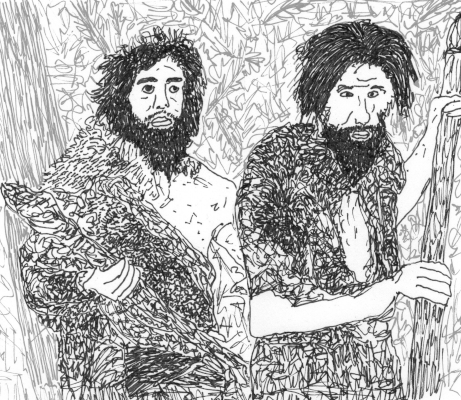 |
In Primeval Times  |
Dans la Préhistoire  |
Nella Preistoria  |
En la Prehistoria  |
(Deutsch) Dies ist die linguistische Version der elften Staffel der Jungs. Die Texte sind dieselben wie auf der Hauptseite. |
(English) This is the linguistic version of the eleventh season of the Boys. The texts are the same as on the main page. |
(Français) Voici la version linguistique de la onzième saison des Gars. Les textes sont les mêmes que sur la page principale. |
(Italiano) Questa è la versione linguistica dell'undicesima stagione dei Ragazzi. I testi sono gli stessi della pagina principale. Colori: parole singole (verde) frasi nominali (azzurro) frasi verbali (ocra) modi di dire + collocazioni (rosso) parolacce + onomatopea + giochi di parole (viola) |
(Español) Esta es la versión lingüística de la undécima temporada de los Chicos. Los textos son los mismos que en la página principal. |
(English) Three weeks after Maria's birth, Heinz and Helmut meet again at Hedu's house and have a lot to talk about. When Heinz picks up the baby, he witnesses a curious occurrence that the others do not notice. |
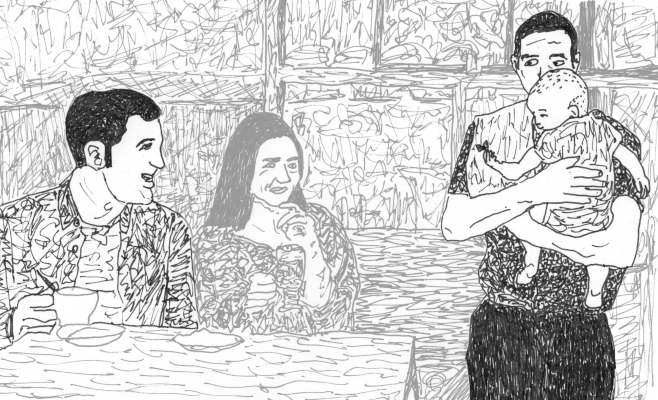 |
(Italiano) Tre settimane dopo la nascita di Maria, Heinz e Helmut si ritrovano a casa di Hedu e hanno un sacco di cose da raccontarsi. Quando Heinz prende in braccio la bambina, è testimone di uno straordinario evento che gli altri non notano. |
(Deutsch) Drei Wochen nach Marias Geburt treffen sich Heinz und Helmut in Hedus Haus wieder und haben einander viel zu erzählen. Als Heinz das Baby auf den Arm nimmt, wird er Zeuge einer sonderbaren Begebenheit, die die anderen nicht bemerken. Normal Version | ||
Tag 1 1 Helmut: Hedu und Maria kommen sofort. Da braucht jemand eine neue Windel. Kaffee? |
Day 1 Helmut: Hedu and Maria are coming right away. Someone needs a new diaper. Coffee? |
Jour 1 Helmut : Hédou et Maria arrivent tout de suite. Quelqu'un a besoin d'une nouvelle couche. Du café ? |
Giorno 1 Helmut: Hedu e Maria arrivano subito. Qualcuno ha bisogno di un pannolino nuovo. Caffè? |
Día 1 Helmut: Hedu y María llegan enseguida. Alguien necesita un pañal nuevo. ¿Café? |
2 Helmut: Auf der Geburtsurkunde steht Maria Francesca, wegen Francesca Albanese, aber ihr richtiger Name ist Maria Gaza. |
Helmut: Her birth certificate says Maria Francesca, because of Francesca Albanese, but her real name is Maria Gaza. |
Helmut : L'acte de naissance dit Maria Francesca, en référence à Francesca Albanese, mais son vrai nom est Maria Gaza. |
Helmut: Sul certificato di nascita c'è scritto Maria Francesca, per Francesca Albanese, ma il suo vero nome è Maria Gaza. |
Helmut: En su partida de nacimiento pone María Francesca, por Francesca Albanese, pero su verdadero nombre es María Gaza. |
3 Heinz: Hallo, ihr beiden! Lasst euch drücken! Äh, vielleicht so? Ja, so geht's. |
Heinz: Hello, you two! Let me give you a hug! Uh, maybe like this? Yes, that works. |
Heinz : Salut, vous deux ! Laissez-vous embrasser ! Euh, peut-être comme ça ? Oui, ça va. |
Heinz: Ciao, voi due! Lasciate che vi abbracci! Ehm, forse così? Sì, va bene. |
Heinz: ¡Hola a las dos! ¡Dejadme que os dé un abrazo! Eh, ¿así? Sí, está bien. |
4 Helmut: Und spürst du ihre Aura? |
Helmut: And can you feel her aura? |
Helmut : Et tu sens son aura ? |
Helmut: E senti la sua aura? |
Helmut: ¿Y sientes su aura? |
(English) Fiona has quickly settled into her new position as managing director, as the agency already has orders waiting. Fanni is surprised by the speed of developments and even more so by the mission on which her friend is sending her. |
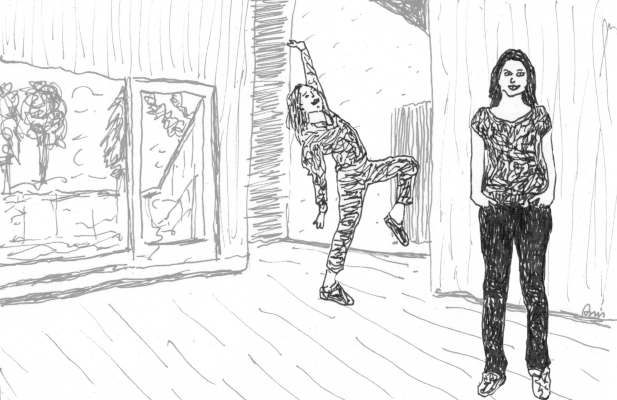 |
(Italiano) Fiona si è ambientata velocemente nel suo nuovo lavoro come gerente, perché ci sono già degli incarichi che aspettano l'agenzia. Fanni è sorpresa dalla rapidità con cui si stanno sviluppando le cose e ancora di più dalla missione che la sua amica le ha affidato. |
(Deutsch) Fiona hat sich schnell in ihre neue Position als Geschäftsführerin eingefunden, denn es warten bereits Aufträge auf die Agentur. Fanni ist überrascht von der Geschwindigkeit der Entwicklungen und noch mehr von der Mission, auf die ihre Freundin sie schickt. Normal Version | ||
Tag 2 1 Fanni: Beeindruckend! |
Day 2 Fanni: Impressive! |
Jour 2 Fanni : Impressionnant ! |
Giorno 2 Fanni: Che figata! |
Día 2 Fanni: ¡Impresionante! |
2 Fiona: Kuck mal auf diesen Kontoauszug! Das ist unser Geschäftskonto. |
Fiona: Look at this bank statement! That's our business account. |
Fiona : Regarde ce relevé bancaire ! C'est notre compte professionnel. |
Fiona: Guarda questo estratto conto! È il nostro conto aziendale. |
Fiona: ¡Mira este extracto bancario! Es nuestra cuenta de la empresa. |
3 Fanni: Du willst mich testen, hab ich recht? Das ist eine seltsame Art von Scherz oder so was. |
Fanni: You're testing me, aren't you? This is some kind of weird joke or something. |
Fanni : Tu me testes, c'est ça ? C'est une sorte de blague bizarre ou quelque chose comme ça. |
Fanni: Mi stai mettendo alla prova, vero? È una specie di scherzo strano o qualcosa del genere. |
Fanni: Me estáis poniendo a prueba, ¿verdad? Es una especie de broma extraña o algo así. |
4 Fanni: Also gut. Ich werd Nicoleta gleich anrufen. Das kommt nur alles so plötzlich. |
Fanni: All right, then. I'll call Nicoleta right away. It's just that everything comes so suddenly. |
Fanni : Bon, d'accord. Je vais appeler Nicoleta tout de suite. C'est juste que tout cela est si soudain. |
Fanni: Va bene, allora. Chiamo subito Nicoleta. È solo che è tutto così improvviso. |
Fanni: Está bien, de acuerdo. Voy a llamar a Nicoleta ahora mismo. Es solo que todo esto es muy repentino. |
(English) The Boys are standing in front of Goethe's house in Frankfurt, ready to travel back in time. Or are they? Helmut has some serious gaps in his knowledge of the late 18th century. In any case, the leap is successful. Or is it? Well, we'll see. |
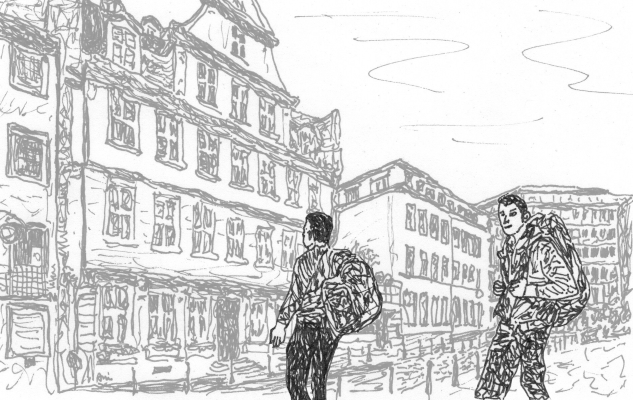 |
(Italiano) I Ragazzi sono davanti alla casa di Goethe a Francoforte e sono pronti per il salto nel tempo. O forse no? Helmut ha un sacco di buchi nella sua conoscenza della fine del XVIII secolo. Il salto comunque riesce. O forse no? Beh, vedremo. |
(Deutsch) Die Jungs stehen vor Goethes Haus in Frankfurt und sind bereit für den Zeitsprung. Oder nicht? Bei Helmut klaffen allerlei Lücken, was Kenntnisse über das spätere achtzehnte Jahrhundert betrifft. Der Sprung jedenfalls gelingt. Oder nicht? Nun, man wird sehen. Normal Version | ||
Tag 4 1 Heinz: Großer Hirschgraben 23. Die Adresse der Familie Goethe in Frankfurt. Wir sind da. Lass uns alles noch mal in Ruhe durchgehen, bevor wir ins Jahr 1774 reisen. |
Day 4 Heinz: Großer Hirschgraben 23. The Goethe family's address in Frankfurt. Here we are. Let's go through everything again thoroughly before we travel back to the year 1774. |
Jour 4 Heinz : Großer Hirschgraben 23. L'adresse de la famille Goethe à Francfort. On y est. Revoyons tout en détail avant de nous rendre en 1774. |
Giorno 4 Heinz: Großer Hirschgraben 23. L'indirizzo della famiglia Goethe a Francoforte. Ci siamo. Ripassiamo tutto nei dettagli prima di viaggiare nel 1774. |
Día 4 Heinz: Großer Hirschgraben 23. La dirección de la familia Goethe en Fráncfort. Ya estamos. Repasemos todo en detalle antes de viajar al año 1774. |
2 Helmut: Ah! Ich wusste nur noch das mit dem Bestseller. Das Produkt war mir entfallen. |
Helmut: Ah! I only remembered the bestseller bit. I forgot the product. |
Helmut : Ah ! Je ne me souvenais que du best-seller. Le produit m'avait échappé. |
Helmut: Ah! Mi ricordavo solo che era un bestseller. Il prodotto mi era sfuggito. |
Helmut: ¡Ah! Solo recordaba lo del éxito de ventas. Se me había escapado el producto. |
3 Helmut: OK, vergessen wir mal dieses Buch! Wie sieht es sonst so aus? Elektrizität zum Beispiel. Das gab's damals noch nicht überall, stimmt's? |
Helmut: OK, let's forget about that book! What about everything else? Electricity, for example. That didn't exist everywhere back then, right? |
Helmut : OK, oublions ce livre ! Et tout le reste ? L'électricité, par exemple. Il n'y en avait pas partout à l'époque, n'est-ce pas ? |
Helmut: Ok, lasciamo perdere quel libro! E tutto il resto? L'elettricità, per esempio. Allora non esisteva ovunque, vero? |
Helmut: ¡Vale, dejemos ese libro! ¿Y todo lo demás? La electricidad, por ejemplo. Entonces no existía en todas partes, ¿verdad? |
4 Heinz: Mann, Goethe! Ich kann's kaum erwarten. Komm, hier ist die Locke. Lass uns starten! |
Heinz: Man, Goethe! I can hardly wait. Come on, here's the curl. Let's get started! |
Heinz : Bon sang, Goethe ! J'ai hâte d'y être. Viens, voici la boucle. C'est parti ! |
Heinz: Amico, Goethe! Non vedo l'ora. Dai, ecco il ricciolo. Partiamo! |
Heinz: ¡Amigo, Goethe! No puedo esperar. Vamos, ahí está el rizo. ¡Empecemos! |
(English) What happened? Instead of exploring historical Frankfurt as planned, the Boys find themselves in a completely different environment. They quickly realize that something must have gone wrong. Fortunately, Helmut is prepared for emergencies like this. |
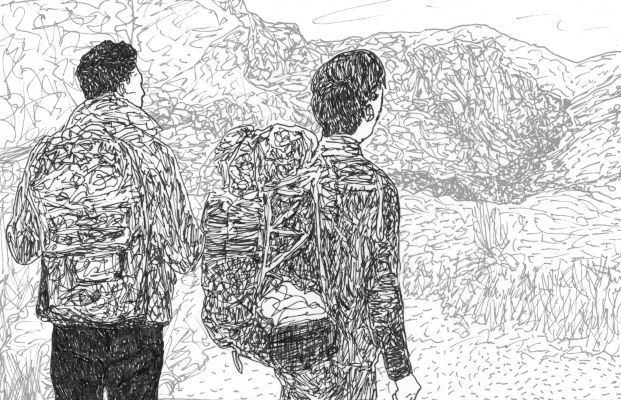 |
(Italiano) Che cosa è successo? Invece di girare per la Francoforte storica come previsto, i Ragazzi si ritrovano in un posto completamente diverso. Capiscono subito che qualcosa è andato storto. Per fortuna Helmut è preparato per emergenze come questa. |
(Deutsch) Was ist passiert? Anstatt sich durch das historische Frankfurt zu bewegen wie geplant, finden sich die Jungs in einer völlig anderen Umgebung wieder. Sie merken schnell, dass irgendetwas schiefgegangen sein muss. Zum Glück ist Helmut auf Notfälle wie diesen vorbereitet. Normal Version | ||
Tag 4 1 Helmut: Wupp |
Day 4 Helmut: Whoop |
Jour 4 Helmut : Woup |
Giorno 4 Helmut: Vup |
Día 4 Helmut: Vup |
2 Heinz: Ich fürchte, wir müssen uns diesmal geschlagen geben. Hier ist kilometerweit keine Zivilisation zu sehen. |
Heinz: I'm afraid we have to admit defeat this time. There's no sign of civilization for miles around. |
Heinz : J'ai bien peur qu'on doive admettre notre défaite cette fois-ci. Il n'y a aucun signe de civilisation à des kilomètres à la ronde. |
Heinz: Temo che questa volta dobbiamo ammettere la sconfitta. Non c'è traccia di civiltà nel raggio di chilometri. |
Heinz: Me temo que esta vez tenemos que admitir la derrota. No hay señales de civilización en kilómetros a la redonda. |
3 Helmut: (...) Es wird gleich dunkel. |
Helmut: (...) It's going to get dark soon. |
Helmut : (...) Il va bientôt faire nuit. |
Helmut: (...) Presto farà buio. |
Helmut: (...) Se va a hacer de noche. |
4 Helmut: Tut mir leid, ich kann nichts dafür. Ich ... ich bin früher zur Strafe in der Kammer eingesperrt worden, und da waren diese ... |
Helmut: I'm sorry, I can't help it. I... I used to be locked in the closet as punishment, and there were these... |
Helmut : Désolé, je ne peux pas m'en empêcher. Je... Quand j'étais petit, on m'enfermait dans le cagibi pour me punir, et il y avait ces... |
Helmut: Mi dispiace, non posso farci niente. Io... da piccolo venivo chiuso in ripostiglio come punizione, e lì c'erano questi... |
Helmut: Lo siento, no puedo evitarlo. Yo... antes me encerraban en el trastero como castigo, y allí había unos... |
(English) For three days now, Heinz and Helmut have been wandering far and wide around the hill where they landed, without success, and their food supplies are dwindling. It's time to make a decision. And time for an edifying discussion about stars and cardinal directions. |
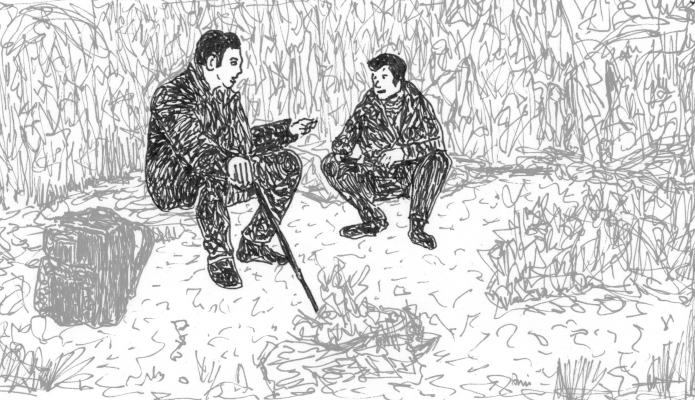 |
(Italiano) Sono già tre giorni che Heinz e Helmut vagano in giro senza successo intorno alla collina dove sono finiti, e le loro scorte di cibo stanno finendo. È ora di prendere una decisione. E di fare una discussione interessante sulle stelle e i punti cardinali. |
(Deutsch) Drei Tage lang irren Heinz und Helmut jetzt schon weitläufig und erfolglos um den Hügel herum, an dem sie gelandet sind, und ihre Nahrungsreserven schwinden. Es ist Zeit für eine Entscheidung. Und für eine erbauliche Diskussion über Sterne und Himmelsrichtungen. Normal Version | ||
Tag 7 1 Helmut: Wir sollten morgen jagen gehen. Wenn wir ausgeschlafen haben. Stocher stocher |
Day 7 Helmut: We should go hunting tomorrow. Once we've had a good night's sleep. Poke poke |
Jour 7 Helmut : On devrait aller chasser demain. Une fois qu'on aura bien dormi. Pique pique |
Giorno 7 Helmut: Domani dovremmo andare a caccia. Dopo una bella dormita. Stuzz stuzz |
Día 7 Helmut: Mañana deberíamos ir a cazar. Después de dormir bien. Hurg hurg |
2 Heinz: Gib mir auch welche! |
Heinz: Give me some too! |
Heinz : Donne-m'en aussi ! |
Heinz: Dammene anche un po'! |
Heinz: ¡Dame también! |
3 Helmut: Was, wenn sie nicht Goethe gehört hat, sondern einem ... Schaf oder so was. Oder einem anderen berühmten Schriftsteller. Sokrates zum Beispiel. |
Helmut: What if it didn't belong to Goethe, but to a... sheep or something. Or another famous writer. Socrates, for example. |
Helmut : Et si elle n'appartenait pas à Goethe, mais à un... mouton ou quelque chose comme ça. Ou à un autre écrivain célèbre. Socrate, par exemple. |
Helmut: E se non appartenesse a Goethe, ma a una... pecora o qualcosa del genere. O a un altro scrittore famoso. Socrate, per esempio. |
Helmut: ¿Y si no era de Goethe, sino de una... oveja o algo así? O de otro escritor famoso. Sócrates, por ejemplo. |
4 Heinz: Eben. Wir gehen strikt in eine Richtung, dann finden wir notfalls auch wieder zurück. Der Norden scheint mir sinnvoll. |
Heinz: Yeah, that's why. We'll go straight in one direction, then we'll find our way back if we have to. North seems like a good idea to me. |
Heinz : Justement. On va aller tout droit dans une direction, alors nous retrouverons le chemin du retour si nécessaire. Le nord me semble raisonnable. |
Heinz: Ecco perché. Andiamo dritti in una direzione, così troveremo la strada del ritorno se necessario. Il nord mi sembra sensato. |
Heinz: Sí, por eso. Vamos a ir estrictamente en una dirección, así encontraremos el camino de vuelta si es necesario. El norte me parece razonable. |
(English) In search of a suitable lunch, the two roam the land as they head north. The unfamiliar flora and fauna are confusing, but they eventually reach a point where they receive some answers. Not necessarily the answers they wanted, but answers nonetheless. |
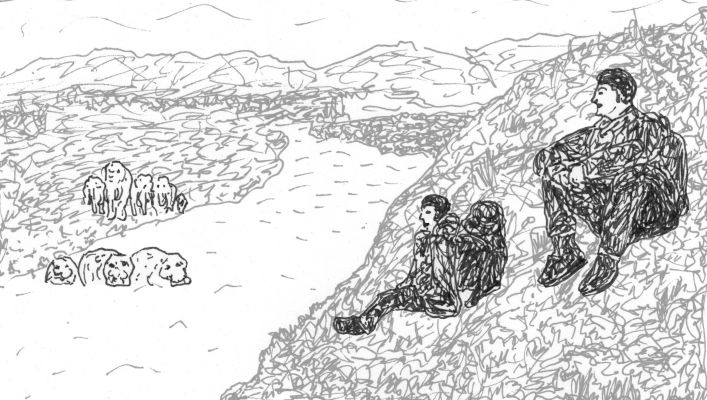 |
(Italiano) Alla ricerca di qualcosa di adatto per pranzo, i due vagano per la campagna in direzione nord. La flora e la fauna sconosciute li confondono, ma alla fine arrivano a un punto in cui ottengono alcune risposte. Non necessariamente quelle che volevano, ma comunque delle risposte.
|
(Deutsch) Auf der Suche nach einem geeigneten Mittagessen durchstreifen die beiden das Land in Richtung Norden. Die ungewohnte Flora und Fauna ist verwirrend, doch kommen sie an einen Punkt, an dem sie endlich einige Antworten erhalten. Nicht unbedingt erwünschte Antworten, aber Antworten. Normal Version | ||
Tag 8 1 Heinz: Aha, so sieht es hier also aus! Bis hier waren wir vorher nicht gekommen. |
Day 8 Heinz: Ah, so this is what it looks like here! We didn't get this far before. |
Jour 8 Heinz : Ah, c'est donc à ça que ça ressemble ici ! On n'était jamais allés aussi loin. |
Giorno 8 Heinz: Ah, quindi è così che è qui! Non siamo mai arrivati così lontano prima d'ora. |
Día 8 Heinz: ¡Ah, así que esto es lo que hay aquí! No habíamos llegado tan lejos antes. |
2 Helmut: Wenn wir Tiere mit Salz füttern, bringen sie uns zu ihren geheimen Wasserreserven. |
Helmut: If we feed salt to animals, they'll take us to their secret water reserves. |
Helmut : Si on donne du sel aux animaux, ils nous mèneront à leurs réserves d'eau secrètes. |
Helmut: Se diamo del sale agli animali, ci porteranno alle loro riserve d'acqua segrete. |
Helmut: Si les damos sal a los animales, nos llevarán a sus reservas secretas de agua. |
3 Heinz: Ist dir die seltsame Flora und Fauna aufgefallen? Sieht eher nach Serengeti aus als nach hessischen Landen. Ich hab noch keinen Apfelbaum gesehen und keine Eiche. |
Heinz: Have you noticed the strange flora and fauna? It looks more like the Serengeti than the countryside of Hesse. I haven't seen a single apple tree or oak tree yet. |
Heinz : As-tu remarqué la flore et la faune étranges ? On dirait plutôt le Serengeti que les terres de Hesse. Je n'ai pas encore vu de pommier ni de chêne. |
Heinz: Hai notato la strana flora e fauna? Sembra più il Serengeti che la terra dell'Assia. Non ho ancora visto né un melo né una quercia. |
Heinz: ¿Te has fijado en la extraña flora y fauna? Parece más el Serengueti que los campos de Hesse. Todavía no he visto ni un solo manzano ni un roble. |
4 Heinz: Was ist schlimmer als Gewalt? |
Heinz: What's worse than violence? |
Heinz : Qu'est-ce qu'il y a de pire que la violence ? |
Heinz: Cosa c'è di peggio della violenza? |
Heinz: ¿Qué hay peor que la violencia? |
(English) Helmut may not have been prepared for the Goethe era, but he manages surprisingly well in prehistoric times. He doesn't let himself get down and still retains his sense of reality. Perhaps that's why fate provides him and Heinz with a little friend. |
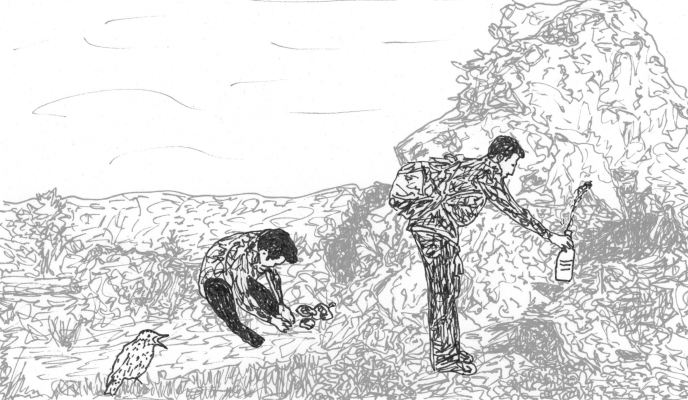 |
(Italiano) Helmut forse non era pronto per l'epoca di Goethe, ma se la cava sorprendentemente bene nell'era preistorica. Non si lascia abbattere e comunque non perde il senso della realtà. Forse è per questo che il destino gli ha messo accanto un piccolo amico, insieme a Heinz. |
(Deutsch) Helmut mag auf die Goethe-Zeit nicht vorbereitet gewesen sein, doch in der Urzeit kommt er erstaunlich gut zurecht. Er lässt sich nicht unterkriegen und verliert trotzdem seinen Sinn für die Realität nicht. Vielleicht ist das der Grund, aus dem das Schicksal ihm und Heinz einen kleinen Freund an die Seite stellt. Normal Version | ||
Tag 8 1 Helmut: Zehntausend Jahre? Bist du irre, Mann? |
Day 8 Helmut: Ten thousand years? Are you crazy, man? |
Jour 8 Helmut : Dix mille ans ? T'es fou, mec ? |
Giorno 8 Helmut: Diecimila anni? Sei fuori di testa, amico? |
Día 8 Helmut: ¿Diez mil años? ¿Estás loco, tío? |
2 Helmut: Probier mal diese rosinenähnliche Frucht hier! Mnjam |
Helmut: Try this raisin-like fruit! Mnyum |
Helmut : Goûte ce fruit qui ressemble à un raisin ! Mnyam |
Helmut: Prova questo frutto tipo uvetta! Mniam |
Helmut: ¡Prueba esta fruta que parece pasas! Mñam |
3 Heinz: Ob das da unten der Rhein ist? Der müsste eigentlich weiter im Westen liegen. |
Heinz: Would that be the Rhine down there? It should be further west. |
Heinz : Est-ce que c'est le Rhin en bas ? Il devrait se trouver plus à l'ouest. |
Heinz: Mi chiedo se quello là sotto sia il Reno. Dovrebbe essere più a ovest. |
Heinz: Me pregunto si eso de ahí abajo es el Rin. Debería estar más al oeste. |
4 Heinz: Also, wenn die Tiere auf unserer Seite sind, dann gibt mir das ein bisschen Hoffnung. |
Heinz: Well, if the animals are on our side, that gives me a little hope. |
Heinz : Bon, si les animaux sont de notre côté, ça me donne un peu d'espoir. |
Heinz: Beh, se gli animali sono dalla nostra parte, questo mi dà un po' di speranza. |
Heinz: Bueno, si los animales están de nuestro lado, eso me da un poco de esperanza. |
(English) They have been living in their shelter for three weeks now, and little has happened. Heinz should be happy that Helmut is looking ahead and taking the initiative, but he seems a little overwhelmed by the situation. Understandable, in a way. |
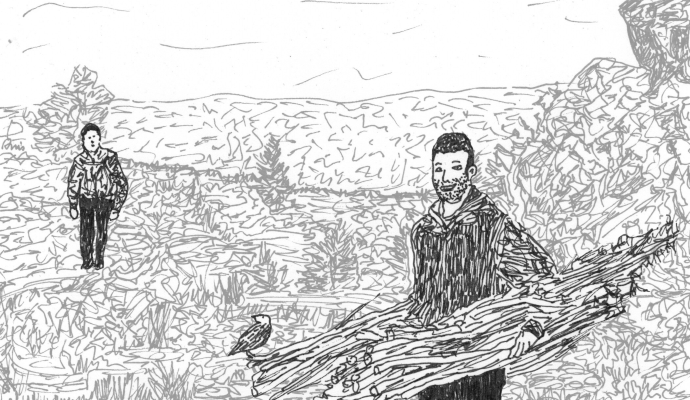 |
(Italiano) Sono ormai tre settimane che vivono nel loro rifugio e non è successo quasi niente. In realtà Heinz dovrebbe essere contento che Helmut stia pensando al futuro e stia prendendo l'iniziativa, ma sembra un po' sopraffatto dalla situazione. In un certo senso è comprensibile. |
(Deutsch) Seit drei Wochen leben sie nun in ihrem Unterschlupf und wenig ist passiert. Eigentlich sollte sich Heinz darüber freuen, dass Helmut planvoll in die Zukunft blickt und die Initiative ergreift, doch ist er wohl mit der Situation ein wenig überfordert. Verständlich, irgendwie. Normal Version | ||
Tag 29 1 Heinz: Was bastelst du da eigentlich seit Tagen, verrätst du es mir endlich? Willst du ein riesiges Feuer machen, um Menschen anzulocken? |
Day 29 Heinz: What have you been cooking up for days now? Will you finally tell me? Are you planning to build a huge fire to attract humans? |
Jour 29 Heinz : Qu'est-ce que tu mijotes depuis des jours ? Tu vas enfin me le dire ? Tu prévois d'allumer un énorme feu pour attirer des humains ? |
Giorno 29 Heinz: Che cosa stai combinando da giorni? Me lo dici finalmente? Vuoi accendere un falò enorme per attirare degli umani? |
Día 29 Heinz: ¿Qué estás tramando desde hace días? ¿Me lo vas a decir por fin? ¿Quieres encender una hoguera enorme para atraer a unos humanos? |
2 Heinz: Nichts passiert? Wir waren fischen am Rhein, sind mehrmals vor wilden Tieren weggelaufen ... |
Heinz: Nothing happened? We went fishing on the Rhine, ran away from wild animals several times... |
Heinz : Rien ne s'est passé ? On est allés pêcher sur le Rhin, on a fui plusieurs fois des animaux sauvages... |
Heinz: Non è successo niente? Siamo andati a pescare sul Reno, siamo scappati più volte dagli animali selvatici... |
Heinz: ¿No ha pasado nada? Fuimos a pescar al Rin, huimos varias veces de animales salvajes... |
3 Heinz: Du hast das wochenlang geplant. Ich dachte, dass du vielleicht einen Zaun baust. |
Heinz: You've been planning this for weeks. I thought you were building a fence. |
Heinz : Ça fait des semaines que tu prépares ça. Je croyais que tu construisais peut-être une clôture. |
Heinz: È da settimane che lo pianifichi. Pensavo che stessi costruendo una recinzione. |
Heinz: Llevas semanas planeando esto. Pensaba que estabas construyendo una valla. |
4 Heinz: Hm. |
Heinz: Hm. |
Heinz : Hum. |
Heinz: Mmm. |
Heinz: Hm. |
(English) The next day, the raft is ready to set off. Helmut has now fully integrated into his surroundings and is doing his best to infect his traveling companion with his energy and optimism, but Heinz is slow to get used to the prehistoric conditions. |
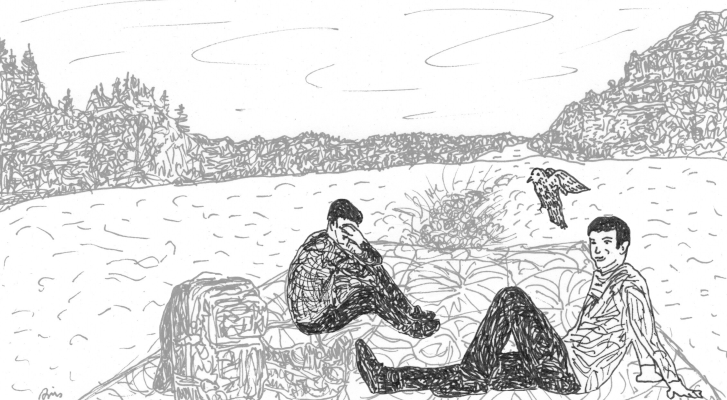 |
(Italiano) Il giorno dopo la zattera è pronta per partire. Helmut si è ormai integrato perfettamente nell'ambiente e fa di tutto per trasmettere al suo compagno di viaggio la sua energia e il suo ottimismo, ma Heinz si abitua solo lentamente alle condizioni preistoriche.
|
(Deutsch) Am nächsten Tag ist das Floß bereit für die Abfahrt. Helmut ist inzwischen voll in seine Umgebung integriert und gibt sich redlich Mühe, seinen Reisegefährten mit seiner Energie und Zuversicht anzustecken, doch Heinz gewöhnt sich nur langsam an die prähistorischen Umstände. Normal Version | ||
Tag 30 1 Heinz: Sind das alle Lotusblätter oder sind da noch irgendwo welche? Helmut? Wo ist der Typ? Ah, da kommt er ja. Haben wir noch mehr Blätter? |
Day 30 Heinz: Are those all the lotus leaves, or are there any more somewhere? Helmut? Where is that guy? Ah, here he comes. Do we have any more leaves? |
Jour 30 Heinz : C'est tout ce qu'il y a comme feuilles de lotus, ou il y en a d'autres quelque part ? Helmut ? Où est le gars ? Ah, le voilà qui arrive. On a d'autres feuilles ? |
Giorno 30 Heinz: Sono tutte le foglie di loto o ce ne sono altre da qualche parte? Helmut? Dov'è quel ragazzo? Ah, eccolo che arriva. Abbiamo altre foglie? |
Día 30 Heinz: ¿Esas son todas las hojas de loto que hay, o hay más en algún otro sitio? ¿Helmut? ¿Dónde está el chico? Ah, ahí viene. ¿Tenemos más hojas? |
2 Heinz: Und ich Idiot hab nur einen Haufen Papier im Rucksack. |
Heinz: And I, idiot that I am, only have a pile of paper in my backpack. |
Heinz : Et moi, idiot que je suis, je n'ai qu'un tas de papier dans mon sac à dos. |
Heinz: E io, stupido, ho solo un mucchio di carta nello zaino. |
Heinz: Y yo, tonto, solo tengo un montón de papel en la mochila. |
3 Heinz: Lass uns noch welche von den Samtblättern mitnehmen, so zwanzig Stück. Hm, die Stängel lassen sich nicht abbrechen. Wie hast du ...? Oh, der Sägestift, natürlich. |
Heinz: Let's take some of the velvet leaves with us, about twenty. Hm, the stems can't be broken off. How did you...? Oh, the saw pen, of course. |
Heinz : Prenons encore quelques feuilles de velours, une vingtaine. Hum, les tiges ne se cassent pas. Comment as-tu... ? Ah, le stylo-scie, bien sûr. |
Heinz: Prendiamo ancora alcune foglie di velluto, una ventina. Hm, i gambi non si possono staccare. Come hai fatto...? Oh, la matita sega, ovviamente. |
Heinz: Llevémonos algunas de las hojas de terciopelo, unas veinte. Hm, los tallos no se pueden romper. ¿Cómo lo has hecho...? Ah, el lápiz de sierra, claro. |
4 Helmut: Ja, so ist es gut. Das tritt sich fest. Ach so, die drei Ruder muss ich noch in die Endform bringen. Säg säg säg säg. Perfekt. Alles klar, dann lass uns unsere Titanic mal zu Wasser lassen! Schieb schieb |
Helmut: Yes, that's good. It'll stick. Oh, I still have to finish the three oars. Saw saw saw saw. Perfect. All right, let's launch our Titanic! Push push |
Helmut : Oui, c'est bien. Ça tiendra. Oh, je dois encore finir les trois rames. Scie scie scie scie. Parfait. Très bien, alors mettons notre Titanic à l'eau ! Pousse pousse |
Helmut: Sì, va bene. Si incolla bene. Oh, devo ancora finire i tre remi. Sega sega sega. Perfetto. Bene, lanciamo il nostro Titanic! Sping sping |
Helmut: Sí, está bien. Se fija. Oh, todavía tengo que terminar los tres remos. Serr serr serr serr. Perfecto. Muy bien, ¡botemos nuestro Titanic! Mpuj mpuj |
(English) Helmut catches a big fish from the raft. To grill it, they go ashore on an island in the Rhine that is no ordinary island. Helmut becomes astonishingly creative there and has a shamanic experience for which he has to pay a price. |
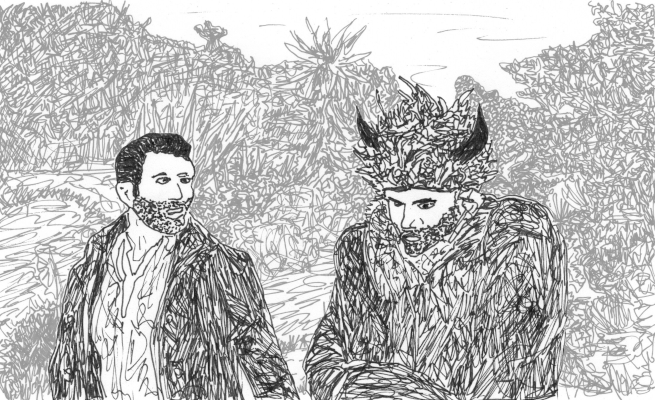 |
(Italiano) Helmut pesca un grosso pesce dalla zattera. Per grigliarlo, approdano su un'isola del Reno che non è un'isola qualsiasi. Helmut diventa incredibilmente creativo lì e vive un'esperienza sciamanica per la quale deve pagare un prezzo. |
(Deutsch) Helmut fängt vom Floß aus einen großen Fisch. Um ihn zu grillen, landen sie an einer Insel im Rhein, die keine gewöhnliche Insel ist. Helmut wird auf ihr erstaunlich kreativ und hat dort ein schamanisches Erlebnis, für das er einen Preis bezahlen muss. Normal Version | ||
Odins Helm Tag 33 1 Heinz: Brauchst du Hilfe? |
Day 33 Heinz: Do you need help? |
Jour 33 Heinz : T'as besoin d'un coup de main ? |
Giorno 33 Heinz: Hai bisogno di una mano? |
Día 33 Heinz: ¿Necesitas ayuda? |
2 Helmut: Meinetwegen. Dann lass uns jetzt den Fisch grillen! Die Frage ist, wo. |
Helmut: Fine by me. Let's grill the fish, then! The question is, where? |
Helmut : Ça me va. On va faire griller le poisson, alors ! La question est : où ? |
Helmut: Per me va bene. Grigliamo il pesce, allora! La domanda è: dove? |
Helmut: Por mí está bien. ¡Pues vamos a asar el pescado! La pregunta es: ¿dónde? |
3 Helmut: Beschwer dich nicht, das war eine relativ sanfte Landung. Und du bist nicht ins Wasser gefallen, wo die Urzeitmonster lauern. |
Helmut: Don't complain, it was a relatively soft landing. And you didn't fall into the water where the prehistoric monsters lurk. |
Helmut : Ne te plains pas, l'atterrissage était relativement doux. Et tu n'es pas tombé à l'eau où rôdent les monstres préhistoriques. |
Helmut: Non lamentarti, è stato un atterraggio relativamente morbido. E non sei caduto in acqua dove si nascondono i mostri preistorici. |
Helmut: No te quejes, ha sido un aterrizaje relativamente suave. Y no te has caído al agua, donde acechan los monstruos prehistóricos. |
4 Heinz: Bieker hat dir bunte Steinchen und Federn gebracht, hast du gesehen? Links neben dir. Für deinen Bausatz. |
Heinz: Beeker brought you some colorful stones and feathers, did you see? On your left. For your model kit. |
Heinz : Biqueur t'a apporté des petites pierres colorées et des plumes, tu as vu ? À ta gauche. Pour ton modèle. |
Heinz: Bìker ti ha portato delle pietre colorate e delle piume, hai visto? Alla tua sinistra. Per il tuo modellino. |
Heinz: Bíker te ha traído unas piedras de colores y unas plumas, ¿las has visto? A tu izquierda. Para tu maqueta. |
(English) Helmut is on a mind trip and Heinz doesn't know what to make of it. On the one hand, the shaman Helmut can see into the future and prevent danger, but on the other hand, he posesses a kind of knowledge that Heinz doesn't want to share with him under any circumstances. |
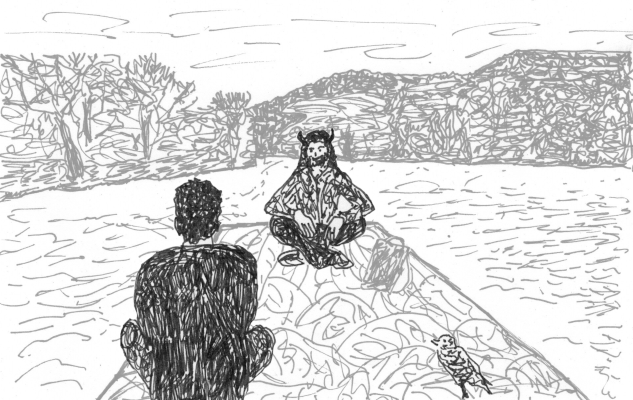 |
(Italiano) Helmut è come su un altro pianeta e Heinz non sa bene cosa pensare. Da un lato, lo sciamano Helmut può vedere il futuro e prevenire i pericoli, ma dall'altro possiede un tipo di conoscenza che Heinz non vuole assolutamente che lui conosca. |
(Deutsch) Helmut ist auf einem Trip und Heinz weiß nicht, was er davon halten soll. Einerseits kann der Schamane Helmut in die Zukunft sehen und Gefahren vorbeugen, andererseits hat er eine Art von Wissen, die Heinz auf gar keinen Fall mit ihm teilen will. Normal Version | ||
Tag 34 1 Heinz: Wie geht's deinem Auge? |
Day 34 Heinz: How's your eye? |
Jour 34 Heinz : Comment va ton il ? |
Giorno 34 Heinz: Come va l'occhio? |
Día 34 Heinz: ¿Cómo está tu ojo? |
2 Helmut: Das Meer! Mimir. |
Helmut: The sea! Mimir. |
Helmut : La mer ! Mimir. |
Helmut: Il mare! Mimir. |
Helmut: ¡El mar! Mimir. |
3 Heinz: Ach Mensch Helmut! So, jetzt nehm ich dir den Helm ab, das reicht langsam. Plopp |
Heinz: Oh, come on, Helmut! Right, I'm taking your helmet off now, I've had it. Pop |
Heinz : Allez, Helmut ! Bon, je vais t'enlever ton casque maintenant, j'en ai marre. Pop |
Heinz: Oh, dai, Helmut! Va bene, ora ti tolgo l'elmo, ne ho abbastanza. Plop |
Heinz: ¡Oh, vamos, Helmut! Bueno, ahora te voy a quitar el yelmo, ya estoy harto. Plop |
4 Heinz: Und? |
Heinz: And? |
Heinz : Et alors ? |
Heinz: E allora? |
Heinz: ¿Y? |
(English) They arrive further west by the sea than they had anticipated, but that does not matter. Eager for adventure, they explore the beach and discuss their next steps when they notice a distinctive location that will set their journey on a new course. |
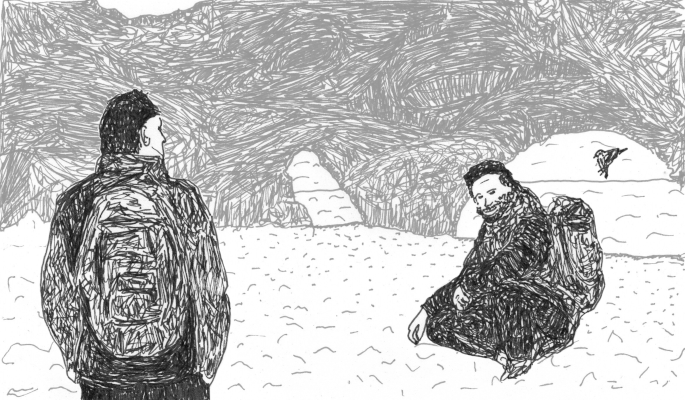 |
(Italiano) Arrivano al mare più a ovest di quanto pensassero, ma non importa. Pieni di spirito d'avventura, esplorano la spiaggia e discutono su come procedere, quando notano un luogo particolare che cambierà il corso del loro viaggio. |
(Deutsch) Sie kommen weiter westlich am Meer an, als sie gedacht haben, aber das spielt keine Rolle. Voller Abenteuerlust erkunden sie den Strand und beraten sich über ihre Vorgehensweise, als sie einen auffälligen Ort bemerken, der ihre Reise in neue Bahnen lenken wird. Normal Version | ||
Tag 40 1 Heinz: Da kommt er wieder. Er ist ganz aufgeregt. Biek biek |
Day 40 Heinz: Here he comes again. He's all excited. Beek beek |
Jour 40 Heinz : Le voilà qui revient. Il est tout excité. Bique bique |
Giorno 40 Heinz: Eccolo che torna. È tutto eccitato. Biik biik |
Día 40 Heinz: Ahí viene otra vez. Está muy emocionado. Biik biik |
2 Heinz: Hörst du das Meer rauschen? Es ist gleich da vorne. Ich kann es schon riechen. Das ist so aufregend! |
Heinz: Can you hear the sea? It's right there. I can smell it. This is so exciting! |
Heinz : Entends-tu le bruit de la mer ? Elle est juste devant. Je peux déjà la sentir. C'est trop excitant ! |
Heinz: Senti il rumore del mare? È proprio lì davanti. Lo sento già. È così emozionante! |
Heinz: ¿Oyes el ruido del mar? Está justo ahí delante. Ya lo huelo. ¡Qué emocionante! |
3 Helmut: Gibst du mir den Wanderspeer? Ich kann den als Blindenstock benutzen. Danke. |
Helmut: Can you give me the trekking spear? I can use it as a blind man's cane. Thanks. |
Helmut : Tu peux me passer la lance de randonnée ? Je peux m'en servir comme canne d'aveugle. Merci. |
Helmut: Mi passi la lancia da escursionista? La posso usare come bastone da cieco. Grazie. |
Helmut: ¿Me pasas la lanza de senderismo? Puedo usarla como bastón para ciegos. Gracias. |
4 Heinz: (...) Das ist eine Höhle mit mehreren großen Öffnungen zum Meer hin. Und du meinst wirklich, dass wir da einfach reingehen können? |
Heinz: (...) It's a cave with several large openings to the sea. And you really think we can just go in there? |
Heinz : (...) C'est une grotte avec plusieurs grandes ouvertures sur la mer. Et tu penses vraiment qu'on peut tout simplement entrer là-dedans ? |
Heinz: (...) È una grotta con diverse grandi aperture sul mare. E pensi davvero che possiamo semplicemente entrare lì dentro? |
Heinz: (...) Es una cueva con varias aberturas grandes al mar. ¿De verdad crees que podemos entrar ahí sin más? |
(English) Helmut's prophecy has come true and they encounter humans for the first time. Intercultural understanding is not easy, but the two manage to establish initial contact and even prove themselves useful. |
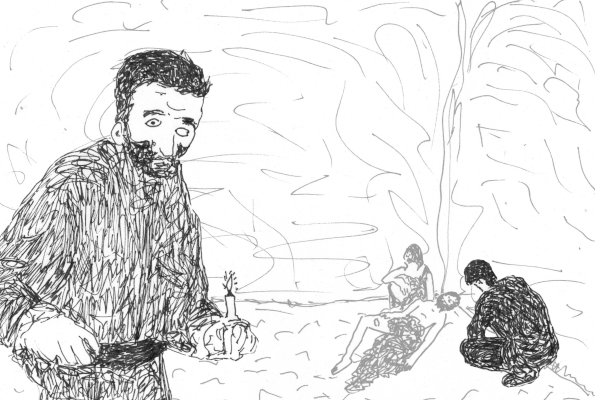 |
(Italiano) La profezia di Helmut si è avverata e incontrano gli umani per la prima volta. La comunicazione tra le culture non è facile, ma i due riescono a stabilire un primo contatto e persino a rendersi utili. |
(Deutsch) Helmuts Prophezeiung hat sich erfüllt und sie treffen zum ersten Mal auf Menschen. Die interkulturelle Verständigung ist nicht leicht, doch es gelingt den beiden, einen ersten Kontakt herzustellen und sich sogar als nützlich zu erweisen. Normal Version | ||
Tag 40 1 Heinz: (Halt vorsichtshalber den Klappspeer bereit!) |
Day 40 Heinz: (Hold the folding spear ready, just in case!) |
Jour 40 Heinz : (Tiens la lance pliantevà la main, au cas où !) |
Giorno 40 Heinz: (Tieni pronta la lancia pieghevole, non si sa mai!) |
Día 40 Heinz: (¡Ten lista la lanza plegable, por si acaso!) |
2 Heinz: Das ist Schmerz, Mann. Da ist was mit seinem Bein. Leuchte mal da hin! Ich zieh vorsichtig das Fell zur Seite. |
Heinz: He's in pain, man. Something's wrong with his leg. Shine the light there! I'll pull the fur aside carefully. |
Heinz : C'est de la douleur, mec. Il a un problème avec sa jambe. Éclaire-moi ! Je vais tirer doucement la fourrure sur le côté. |
Heinz: È dolore, amico. Ha qualcosa alla gamba. Fai luce lì! Proverò a tirare delicatamente la pelle da parte. |
Heinz: Es dolor, amigo. Tiene algo en la pierna. ¡Ilumina ahí! Voy a apartar el pelaje con cuidado. |
3 Helmut: Er hat's nicht gerafft. Ich mach's einfach, das muss erst identifiziert werden. |
Helmut: He doesn't get it. I'll just do it, it has to be disconnected first. |
Helmut : Il n'a pas pigé. Je vais simplement le faire, il faut d'abord la désinformer. |
Helmut: Non ha capito. Lo faccio e basta, prima bisogna disinformarla. |
Helmut: No lo ha pillado. Voy a hacerlo, primero hay que desinformarla. |
4 Heinz: Glaubst du nicht, dass das was mit uns zu tun haben könnte? |
Heinz: Don't you think that might have something to do with us? |
Heinz : Tu ne penses pas que ça pourrait avoir un rapport avec nous ? |
Heinz: Non pensi che potrebbe avere qualcosa a che fare con noi? |
Heinz: ¿No crees que eso podría tener algo que ver con nosotros? |
(English) Chaos breaks out. The Boys have to watch as their backpacks are ransacked and they are helpless due to the superior numbers of the others. The predicament gives Heinz an idea and he asks Helmut to put on Odin's helmet. |
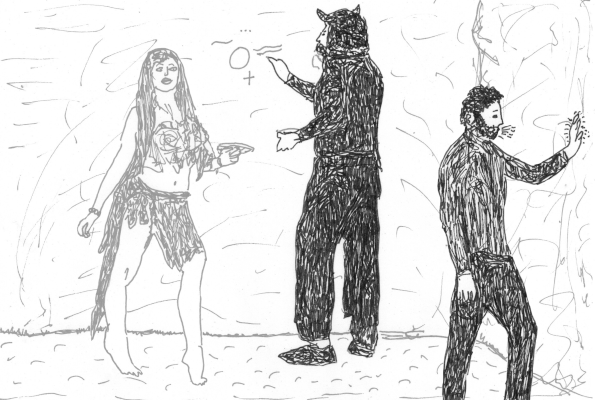 |
(Italiano) Scoppia il caos. I Ragazzi devono guardare mentre i loro zaini vengono saccheggiati e sono impotenti perché gli altri sono in tanti. L'emergenza dà un'idea a Heinz, che chiede a Helmut di mettersi l'elmo di Odino. |
(Deutsch) Chaos bricht aus. Die Jungs müssen mitansehen, wie ihre Rucksäcke geplündert werden und sie sind hilflos aufgrund der Überzahl der anderen. Die Not bringt Heinz auf eine Idee und er bittet Helmut, Odins Helm aufzusetzen. Normal Version | ||
Tag 40 1 Helmut: Hey, Signore! Lass mich los jetzt, Pappnase, es reicht! |
Day 40 Helmut: Hey, signore! Let me go now, you buffoon, that's enough! |
Jour 40 Helmut : Hé, signore ! Lâche-moi maintenant, espèce de bouffon, ça suffit ! |
Giorno 40 Helmut: Ehi, signore! Lasciami andare, buffone, basta così! |
Día 40 Helmut: ¡Eh, signore! ¡Suéltame ya, payaso, ya basta! |
2 Helmut: Sie zwinkert dir zu. |
Helmut: She's winking at you. |
Helmut : Elle te fait un clin d'il. |
Helmut: Ti sta facendo l'occhiolino. |
Helmut: Te está guiñando el ojo. |
3 Helmut: Odin! Ooodiiin!! |
Helmut: Odin! Ooodiiin!! |
Helmut : Odin ! Ooodiiin !! |
Helmut: Odino! Ooodiiinoo!! |
Helmut: ¡Odin! ¡Ooodiiin! |
4 Helmut: Hier, das ist die richtige Wand. Du musst anfangen. Biek biek. Keine Sorge, das ist nur mein Rabe auf meiner Schulter. |
Helmut: Here, this is the right wall. You're the one to start. Beek beek. Don't worry, that's just my raven on my shoulder. |
Helmut : Tiens, c'est le bon mur. C'est toi qui commences. Bique bique. T'inquiète pas, c'est juste mon corbeau sur mon épaule. |
Helmut: Ecco, questo è il muro giusto. Inizia tu. Biik biik. Non ti preoccupare, è solo il mio corvo sulla spalla. |
Helmut: Aquí, esta es la pared correcta. Tú empiezas. Biik biik. No te preocupes, es solo mi cuervo en el hombro. |
(English) After getting to know each other, they all sit around the fire in the dome-like cave structure by the sea. Heinz tries to explain to his friend that he shouldn't transfer his own preconceptions onto these early humans, but Helmut doesn't listen to him. |
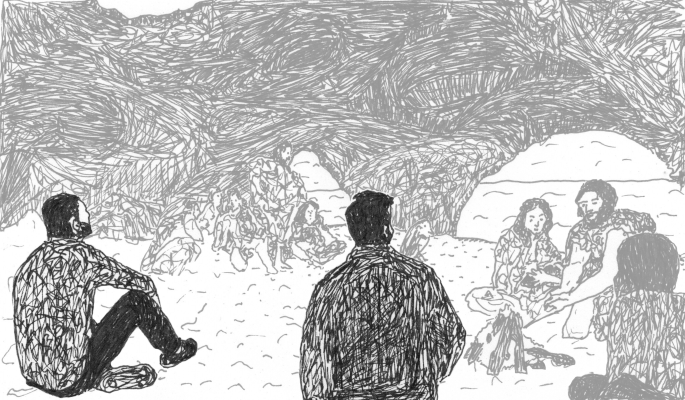 |
(Italiano) Dopo essersi conosciuti, tutti si siedono attorno al fuoco nella struttura a cupola simile a una caverna sul mare. Heinz cerca di spiegare al suo amico che non deve trasferire la sua visione del mondo sui primi esseri umani, ma Helmut non lo ascolta. |
(Deutsch) Nachdem sie sich kennengelernt haben, sitzen alle am Feuer in der kuppelartigen Höhlenstruktur am Meer. Heinz versucht, seinem Freund zu vermitteln, dass er nicht seine eigenen Vorstellungen auf die Frühmenschen übertragen soll, aber Helmut hört nicht auf ihn. Normal Version | ||
Edle Wilde Tag 40 1 Helmut: Ein sehr nettes Urvölkchen. Die verstehen es, zu leben! So ursprünglich. |
Day 40 Helmut: A very nice bunch of primeval people. They know how to live! So authentic. |
Jour 40 Helmut : Un groupe très sympa de gens préhistoriques. Ils savent comment vivre ! Tellement authentiques. |
Giorno 40 Helmut: Un gruppo di gente preistorica davvero simpatica. Sanno come si vive! Sono così autentici. |
Día 40 Helmut: Un grupo muy simpático de gente prehistórica. ¡Saben cómo vivir! Son tan auténticos. |
2 Helmut: Ah, danke. Wie heißt denn du? Dein Name. Ich Helmut. Hel-mut. Und du? Fim? Fim. OK. Heinz, das Mädchen hat uns unsere Rucksäcke zurückgebracht. Sie respektieren unseren Besitz. Ritsch. Da fehlt nichts, siehst du? Nur das Zelt haben sie nicht wieder in die Tüte gekriegt, hi hi. |
Helmut: Ah, thank you. What's your name? Me Helmut. Hel-mut. And you? Fim? Fim. OK. Heinz, the girl brought back our backpacks. They respect our property. Zip. Nothing's missing, see? They just couldn't get the tent back into the bag, hee hee. |
Helmut : Ah, merci. Comment tu t'appelles ? Ton nom. Moi, Helmut. Hel-mut. Et toi ? Fim ? Fim. OK. Heinz, la fille nous a rendu nos sacs à dos. Ils respectent nos possessions. Zip. Il ne manque rien, tu vois ? Il n'y a que la tente qu'ils n'ont pas réussi à remettre dans le sac, hi hi. |
Helmut: Ah, grazie. Come ti chiami? Tuo nome. Io Helmut. Hel-mut. E tu? Fim? Fim. Ok. Heinz, la ragazza ci ha restituito gli zaini. Rispettano la nostra proprietà. Zip. Non manca niente, vedi? Solo la tenda non sono riusciti a rimetterla nel sacco, eh eh. |
Helmut: Ah, gracias. ¿Cómo te llamas? Tu nombre. Yo Helmut. Hel-mut. ¿Y tú? ¿Fim? Fim. Vale. Heinz, la chica nos ha devuelto las mochilas. Respetan nuestra propiedad. Zip. No falta nada, ¿ves? Solo la tienda no han podido meterla en la bolsa, je, je. |
3 Helmut: Die Wandmalerei meinst du? Die wir vor einer Stunde gemacht haben? |
Helmut: You mean the mural? The one we did an hour ago? |
Helmut : Tu parles de la peinture murale ? Celle que nous avons faite il y a une heure ? |
Helmut: Intendi il murale? Quello che abbiamo fatto un'ora fa? |
Helmut: ¿Te refieres al mural? ¿El que hicimos hace una hora? |
4 Heinz: Wie kannst du so detaillierte Sachen wissen? Das ist unmöglich. Außerdem: Wie sollte die zweite Gruppe uns finden? Waren die schon mal hier? |
Heinz: How can you know such detailed things? That's impossible. Besides, how would the second group find us? Have they been here before? |
Heinz : Comment peux-tu savoir des choses aussi détaillées ? C'est impossible. De plus, comment le deuxième groupe pourrait-il nous trouver ? Sont-ils déjà venus ici ? |
Heinz: Come fai a sapere cose così precise? È impossibile. E poi, come farebbe il secondo gruppo a trovarci? Sono già stati qui? |
Heinz: ¿Cómo puedes saber cosas tan detalladas? Eso es imposible. Además, ¿cómo nos encontraría el segundo grupo? ¿Han estado aquí antes? |
(English) A few days later, the group travels inland and the Boys help carry the tent poles. Heinz has overcome his initial crisis and found his place in the community, while Helmut is somewhat losing track of things. |
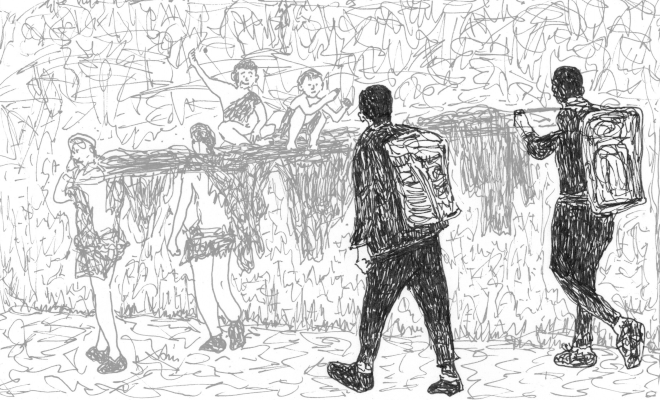 |
(Italiano) Qualche giorno dopo, il gruppo si sposta nell'entroterra e i Ragazzi danno una mano a trasportare i pali delle tende. Heinz ha superato la crisi iniziale e si è integrato nel gruppo, mentre Helmut è un po' disorientato. |
(Deutsch) Einige Tage später reist die Gruppe ins Landesinnere und die Jungs helfen beim Tragen der Zeltstangen. Heinz hat seine anfängliche Krise überwunden und sich in die Gemeinschaft eingefunden, während Helmut ein wenig den Überblick verliert. Normal Version | ||
Tag 43 1 Heinz: Wir wären dann soweit. Helmut? |
Day 43 Heinz: We're ready to go then. Helmut? |
Jour 43 Heinz : On est prêts à partir. Helmut ? |
Giorno 43 Heinz: Allora, siamo pronti per partire. Helmut? |
Día 43 Heinz: Bueno, estamos listos para partir. ¿Helmut? |
2 Heinz: Nein, nicht zurück. Nur vor, OK? Hilfst du tragen? |
Heinz: No, not backward. Only forward, OK? Will you help with carrying? |
Heinz : Non, pas en arrière. Seulement en avant, OK ? Tu m'aides à porter ? |
Heinz: No, non indietro. Solo avanti, ok? Mi aiuti a portare? |
Heinz: No, atrás no. Solo adelante, ¿vale? ¿Me ayudas a llevar esto? |
3 Helmut: Hey, was tut ihr beiden denn da? Fim und ... ääh ... |
Helmut: Hey, what are you two doing? Fim and... um... |
Helmut : Hé, qu'est-ce que vous faites, vous deux ? Fim et... euh... |
Helmut: Ehi, cosa state facendo voi due? Fim e... ehm... |
Helmut: Eh, ¿qué estáis haciendo vosotros dos? Fim y... eh... |
4 Heinz: Wir lernen so viel Neues! Erst dachten wir, dass Klumphilde, äh, Sibat die Chefin ist, aber jetzt wissen wir es besser. |
Heinz: We're learning so many new things! At first we thought Clubby, uh, Zibat was the boss, but now we know better. |
Heinz : On apprend tellement de nouvelles choses ! Au début, on pensait que Piedbotine, euh, Zibat était la chef, mais maintenant on sait que ce n'est pas le cas. |
Heinz: Stiamo imparando tante cose nuove! All'inizio pensavamo che Piedtortella, ehm, Zibat fosse la capa, ma ora sappiamo che non è così. |
Heinz: ¡Estamos aprendiendo tantas cosas nuevas! Al principio pensábamos que Piezambella, eh, Zibat era la jefa, pero ahora sabemos que no es así. |
(English) Helmut's streak of bad luck continues. Not only does he injure himself with an obsidian knife while cutting vegetables, but he also encounters unexpected difficulties when trying to build a wheel. Heinz's patience is at an end, but there is nothing he can do about Helmut's frenzy. |
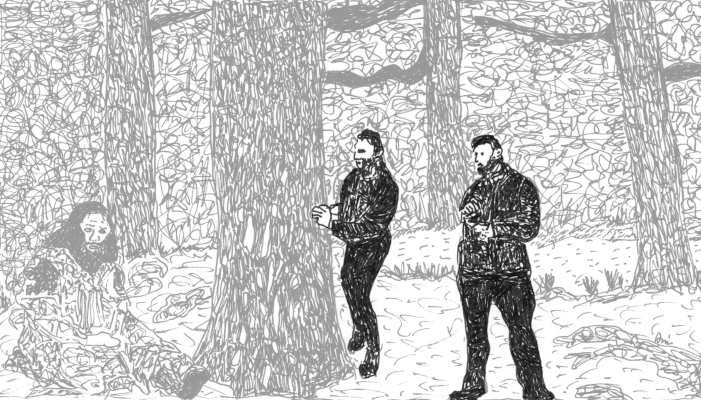 |
(Italiano) La sfortuna di Helmut non finisce mai. Non solo si ferisce con un coltello di ossidiana mentre taglia le verdure, ma incontra anche difficoltà inaspettate quando cerca di costruire una ruota. Heinz è al limite della pazienza, ma non può fare niente contro la frenesia di Helmut. |
(Deutsch) Helmuts Pechsträhne reißt nicht ab. Nicht nur verletzt er sich beim Gemüseschneiden mit einem Obsidianmesser, er bekommt auch ungeahnte Schwierigkeiten, als er ein Rad bauen will. Heinz' Geduld ist am Ende, aber er kann nichts gegen Helmuts Raserei tun. Normal Version | ||
Tag 47 1 Heinz: Und, was sagst du zu unserem neuen Wohnort? Und zu dem Gemüse. |
Day 47 Heinz: So, what do you think of our new home? And the vegetables. |
Jour 47 Heinz : Alors, qu'est-ce que tu penses de notre nouveau lieu de vie ? Et des légumes. |
Giorno 47 Heinz: Allora, che ne pensi del nostro nuovo posto? E delle verdure? |
Día 47 Heinz: ¿Y qué te parece nuestro nuevo lugar de residencia? ¿Y las verduras? |
2 Heinz: Ach ja, dein Rad. Vorsicht! Warte, ich stütz dich. Du hast es wirklich nicht leicht im Moment. |
Heinz: Oh yes, your wheel. Be careful! Wait, I'll support you. You really don't have an easy life at the moment. |
Heinz : Ah oui, ta roue. Attention ! Attends, je te tiens. Tu n'as vraiment pas la vie facile en ce moment. |
Heinz: Ah sì, la tua ruota. Attento! Aspetta, ti aiuto. Non hai proprio vita facile in questo periodo. |
Heinz: Ah, sí, tu rueda. ¡Ten cuidado! Espera, te ayudo. No lo tienes nada fácil últimamente. |
3 Heinz: Stopp, Mann! In welche Richtung soll er denn fallen? |
Heinz: Stop, man! Which way do you want it to fall? |
Heinz : Arrête, mec ! Dans quelle direction veux-tu qu'il tombe ? |
Heinz: Fermati, amico! Da che parte vuoi che cada? |
Heinz: ¡Para, tío! ¿En qué dirección quieres que caiga? |
4 Helmut: Ja, was soll ich denn machen, hä? OK, hier: Rrrzzz rrrzzz kchk rrrzzz rrrzzz rrrzzz |
Helmut: Yeah, well, what am I supposed to do, eh? OK, here: Rrrtsss rrrtsss khk rrrtsss rrrtsss rrrtss |
Helmut : Ouais, bon, qu'est-ce que je suis censé faire, hein ? OK, voilà : Rrrtsss rrrtsss khk rrrtsss rrrtsss rrrtss |
Helmut: Sì, beh, cosa dovrei fare? Ok, ecco: Rrrzzz rrrzzz khk rrrzzz rrrzzz rrrzzz |
Helmut: Sí, bueno, ¿qué se supone que debo hacer? Vale, así: rrrtsss rrrtsss khk rrrtsss rrrtsss rrrtss |
(English) For two weeks now, Helmut has been trying in vain to build wheels for a car. He works stubbornly in the clearing until Heinz can no longer bear to watch and persuades his friend to return to the group. |
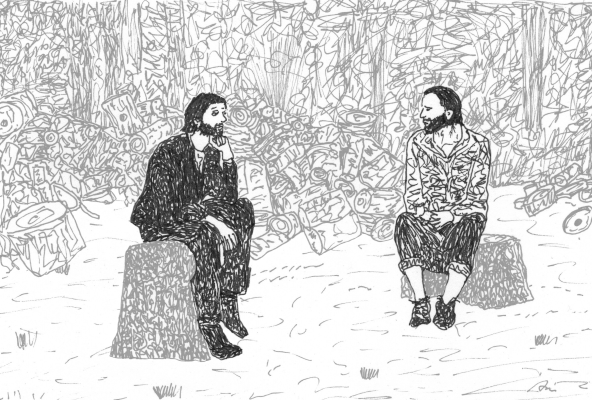 |
(Italiano) Sono già due settimane che Helmut cerca di costruire le ruote per un carro, ma non ci riesce. Lavora con tanta determinazione nella radura finché Heinz non ce la fa più a guardare e convince il suo amico a tornare con il gruppo. |
(Deutsch) Zwei Wochen lang versucht Helmut nun schon vergeblich, Räder für einen Wagen zu bauen. Verbissen arbeitet er auf der Lichtung, bis Heinz es nicht mehr mitansehen kann und seinen Freund überredet, in den Kreis der Gruppe zurückzukehren. Normal Version | ||
Tag 61 1 Helmut: Ah, Heinz, schön, dich zu sehen! Setz dich doch! Ist das ein Maiskolben, den du da in der Hand hältst? Das Gelbe. |
Day 61 Helmut: Ah, Heinz, good to see you! Have a seat! Is that a corn cob you're holding in your hand? The yellow thing. |
Jour 61 Helmut : Ah, Heinz, ça fait plaisir de te voir ! Assieds-toi donc ! C'est un épi de maïs que tu tiens dans ta main ? Le truc jaune. |
Giorno 61 Helmut: Ah, Heinz, che bello vederti! Siediti pure! È una pannocchia quella che hai in mano? Quella cosa gialla. |
Día 61 Helmut: ¡Ah, Heinz, qué alegría verte! ¡Siéntate! ¿Es una mazorca de maíz lo que tienes en la mano? Esa cosa amarilla. |
2 Heinz: Manchmal muss man einsehen, dass man sich verrannt hat, und umkehren. Musste ich auch schon. |
Heinz: Sometimes you have to admit that you've hit a dead end and turn back. It's happened to me too. |
Heinz : Parfois, il faut savoir reconnaître qu'on est dans une impasse et faire demi-tour. Ça m'est déjà arrivé. |
Heinz: A volte bisogna ammettere di essersi imbattuti in un vicolo cieco e tornare indietro. È successo anche a me. |
Heinz: A veces hay que admitir que se ha llegado a un callejón sin salida y dar marcha atrás. A mí también ya me ha pasado. |
3 Heinz: Kommst du jetzt mit zum Jagen? Wadra und Wern haben im Süden am Silbersee Rentiere gesehen. Oder so was. |
Heinz: Are you coming hunting with us now? Vadra and Vern saw reindeer in the south at the Silver Lake. Or something like that. |
Heinz : Tu viens chasser avec nous alors ? Vadra et Vern ont vu des rennes dans le sud, au Lac d'Argent. Ou quelque chose comme ça. |
Heinz: Allora vieni a caccia con noi? Vadra e Vern hanno visto delle renne a sud, al Lago d'Argento. O qualcosa del genere. |
Heinz: Y bien, ¿vienes a cazar con nosotros? Vadra y Vern han visto renos en el sur, en el Lago de Plata. O algo así. |
4 Helmut: Hi hi hi. Und wer war alles dabei? War Ano-if da? |
Helmut: Hee hee hee. And who was there? Was Ano-eef there? |
Helmut : Hi hi hi. Et qui était présent ? Anoïf était-elle là ? |
Helmut: Hi hi hi. E chi c'era? C'era Anoif? |
Helmut: Je, je, je. ¿Y quién estaba allí? ¿Estaba Anoif? |
(English) Helmut has found a new use for his prehistoric lathe: chess pieces. A month later, more than half the group is in chess fever. Heinz is worried that they might inadvertently change the course of history in the process. |
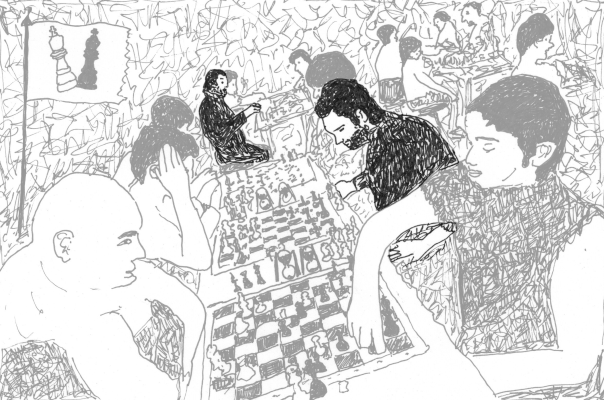 |
(Italiano) Helmut ha trovato un nuovo uso per il suo tornio preistorico: pezzi di scacchi. Un mese dopo, più della metà del gruppo è in preda alla febbre degli scacchi. Heinz teme che possano inavvertitamente cambiare il corso della storia a causa loro. |
(Deutsch) Helmut hat eine neue Verwendung für seine prähistorische Drehbank gefunden: Schachfiguren. Einen Monat später ist mehr als die Hälfte der Gruppe im Schachfieber. Heinz macht sich Sorgen darüber, dass sie damit vielleicht ungewollt den Lauf der Geschichte verändern. Normal Version | ||
Tag 90 1 Heinz: Ich will dich ja nicht runterziehen, aber mir kommen langsam ein paar Bedenken. |
Day 90 Heinz: I don't want to drag you down, but I'm starting to have a few doubts. |
Jour 90 Heinz : Je ne veux pas te tirer vers le bas, mais je commence à avoir quelques doutes. |
Giorno 90 Heinz: Non voglio trascinarti in basso, ma comincio ad avere qualche dubbio. |
Día 90 Heinz: No quiero desanimarte, pero empiezo a tener algunas dudas. |
2 Heinz: Positiv zu vermerken ist allerdings, dass das Schachspiel Wern vom Alkoholismus abgebracht hat. Er wäre fast dem Gaba verfallen. |
Heinz: On a positive note, however, chess has turned Vern away from alcoholism. He almost succumbed to gaba. |
Heinz : Sur une note positive, cependant, le jeu d'échecs a détourné Vern de l'alcoolisme. Il a failli succomber à la gaba. |
Heinz: Una nota positiva è che gli scacchi hanno allontanato Vern dall'alcolismo. Ha rischiato di soccombere alla gaba. |
Heinz: Como nota positiva, sin embargo, el ajedrez ha alejado a Vern del alcoholismo. Estuvo a punto de sucumbir a la gaba. |
3 Helmut: Ich kann mich an deine Ausrede nicht mehr erinnern. Es war jedenfalls ein wichtiges Treffen. Ziehst du jetzt oder was? Aha, e4. Und Ano-if antwortet mit der sizilianischen Verteidigung. Hervorragend. |
Helmut: I can't remember your excuse. Anyway, it was an important meeting. Are you making a move now or what? Uh-huh, e4. And Ano-eef replies with the Sicilian Defense. Excellent. |
Helmut : Je ne me souviens plus de ton excuse. En tout cas, c'était une réunion importante. Tu joues ou quoi ? Ah bon, e4. Et Anoïf répond avec la défense sicilienne. Excellent. |
Helmut: Non ricordo la tua scusa. Comunque, era una riunione importante. Vuoi fare una mossa ora o cosa? Ah beh, e4. E Anoif risponde con la difesa siciliana. Eccellente. |
Helmut: No recuerdo tu excusa. De todos modos, era una reunión importante. ¿Ahora vas a mover ficha o qué? Ajá, e4. Y Anoif responde con la defensa siciliana. Excelente. |
4 Helmut: Die Uhr hat Bagd konstruiert. Aus diesen fast durchsichtigen Kugeln der Riesenblume. Wenn man die trocknet ... |
Helmut: The clock was made by Bagd. From these almost transparent balls of the giant flower. If you dry them... |
Helmut : C'est Bagd qui a construit ce sablier. Avec ces boules presque transparentes de la fleur géante. Si tu les fais sécher... |
Helmut: La clessidra è stata realizzata da Bagd. Da queste palline quasi trasparenti del fiore gigante. Se le fai seccare... |
Helmut: El reloj fue hecho por Bagd. De estas bolas casi transparentes de la flor gigante. Si las secas... |
(English) Every twelve days, the tribe celebrates a day of honor for one of its members. Heinz is uncomfortable about it being his turn, so Helmut has to motivate him a little. But then everything goes well, and the two notice how quickly the primeval humans are developing. |
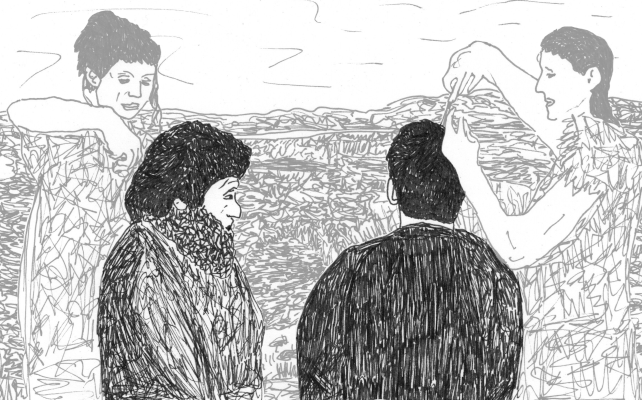 |
(Italiano) Ogni dodici giorni la tribù festeggia un giorno d'onore per uno dei suoi membri. Heinz è a disagio perché quel giorno tocca a lui, quindi Helmut deve motivarlo un po'. Ma poi tutto va bene e i due notano quanto velocemente si evolvano gli uomini preistorici. |
(Deutsch) Alle zwölf Tage feiert der Stamm einen Ehrentag für eines der Mitglieder. Heinz ist es unangenehm, an diesem Tag an der Reihe zu sein, sodass Helmut ihn ein wenig motivieren muss. Dann aber läuft alles gut und den beiden fällt auf, wie schnell sich die Urmenschen entwickeln. Normal Version | ||
Ehrentag Tag 120 1 Helmut: Biek biek. Ah, Bote, äh, Bieker, da bist du ja! Ähem, Heinz! Wieder sind zwölf Tage vergangen. Weißt du, was das bedeutet? |
Day 120 Helmut: Beek beek. Ah, messenger, uh, Beeker, there you are! Ahem, Heinz! Another twelve days have passed. Do you know what that means? |
Jour 120 Helmut : Bique bique. Ah, messager, euh, Biqueur, te voilà ! Ahem, Heinz ! Douze jours se sont encore écoulés. Tu sais ce que cela signifie ? |
Giorno 120 Helmut: Biik biik. Ah, messaggero, ehm, Bìker, eccoti! Dunque, Heinz! Sono passati altri dodici giorni. Sai cosa significa? |
de honor Día 120 Helmut: Biik biik. Ah, mensajero, eh, Bíker, ¡ahí estás! ¡Ejem, Heinz! Han pasado otros doce días. ¿Sabes lo que eso significa? |
2 Heinz: (...) Also, dieses Schaumbad war schon mal der Hammer. Wow! Tropf tropf |
Heinz: (...) Now, that bubble bath sure was something else. Wow! Drip drip |
Heinz : (...) Bon, ce bain moussant, c'était déjà quelque chose. Wahou ! Goutte goutte |
Heinz: (...) Beh, quel bagno di schiuma era già fantastico. Wow! Goccia goccia... |
Heinz: (...) Bueno, ese baño de espuma ya fue fantástico. ¡Guau! Gota gota... |
3 Helmut: Äh, Buto, kann ich mal den Spiegel haben? |
Helmut: Uh, Buto, can you pass me the mirror? |
Helmut : Euh, Bouto, tu peux me passer le miroir ? |
Helmut: Ehm, Buto, mi passi lo specchio? |
Helmut: Eh, Buto, ¿me pasas el espejo? |
4 Heinz: Was machen denn Wadra und Wern da vorne? Haben die einen Ameisenhaufen angezündet? |
Heinz: What are Vadra and Vern doing over there? Are they setting fire to an anthill? |
Heinz : Qu'est-ce que Vadra et Vern font là-bas ? Ils mettent le feu à une fourmilière ? |
Heinz: Cosa stanno facendo Vadra e Vern laggiù? Hanno dato fuoco a un formicaio? |
Heinz: ¿Qué están haciendo Vadra y Vern por allí? ¿Están prendiendo fuego a un hormiguero? |
(English) Helmut thinks that the development of the prehistoric group has come to an end. Heinz does not share this opinion and introduces his friend to some of the key ideas of the Enlightenment, while keeping an eye out for Ano-eef, whom he calls Fiona. |
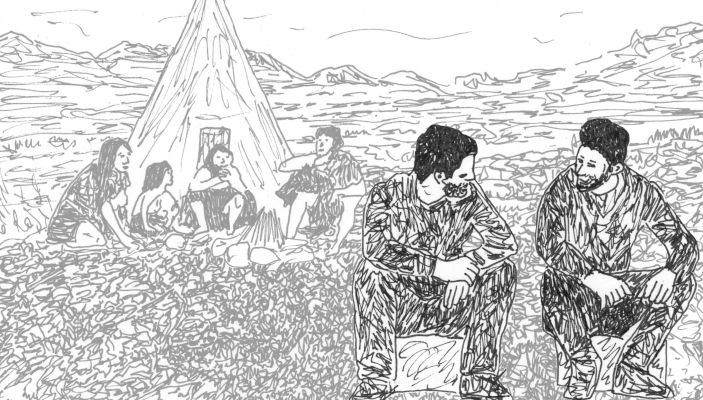 |
(Italiano) Helmut pensa che l'evoluzione del gruppo preistorico sia arrivata alla fine. Heinz non è d'accordo e spiega ad Helmut alcune delle idee principali dell'Illuminismo, mentre cerca con lo sguardo Anoif, che lui chiama Fiona. |
(Deutsch) Helmut denkt, dass die Entwicklung der prähistorischen Gruppe ein Ende gefunden hat. Heinz teilt diese Meinung nicht und bringt seinem Freund einige der wesentlichen Ideen der Aufklärung nahe, während seine Augen nach Ano-if Ausschau halten, die er Fiona nennt. Normal Version | ||
Tag 151 1 Heinz: Fiona sagt, dass wir bald aufbrechen werden. Sibat will heute Abend in einem schamanischen Ritual den genauen Tag bestimmen. |
Day 151 Heinz: Fiona says we're leaving soon. Zibat wants to determine the exact day tonight during in a shamanic ritual. |
Jour 151 Heinz : Fiona dit que nous allons bientôt partir. Zibat veut déterminer le jour exact lors d'un rituel chamanique ce soir. |
Giorno 151 Heinz: Fiona dice che presto partiremo. Zibat vuole decidere il giorno esatto tramite un rituale sciamanico stasera. |
Día 151 Heinz: Fiona dice que pronto nos pondremos en marcha. Sibat quiere determinar el día exacto esta noche mediante un ritual chamánico. |
2 Heinz: Wann? |
Heinz: When? |
Heinz : Quand ? |
Heinz: Quando? |
Heinz: ¿Cuándo? |
3 Heinz: Wie ungerecht! Nur weil Wern so blöd ist, in flüssiges Metall zu stolpern, müssen alle darunter leiden! |
Heinz: How unfair! Just because Vern is stupid enough to stumble into liquid metal, everyone has to suffer! |
Heinz : Quelle injustice ! Tout le monde doit souffrir juste parce que Vern est assez bête pour trébucher dans du métal liquide ! |
Heinz: Che ingiustizia! Solo perché Vern è così stupido da inciampare nel metallo liquido, devono soffrire tutti! |
Heinz: ¡Qué injusto! ¡Solo porque Vern es tan estúpido como para tropezar y caer en metal líquido, todos tienen que sufrir! |
4 Heinz: Hm. Jean-Jacques Rousseau. |
Heinz: Hm. Jean-Jacques Rousseau. |
Heinz : Hum. Jean-Jacques Rousseau. |
Heinz: Hm. Jean-Jacques Rousseau. |
Heinz: Hm. Jean-Jacques Rousseau. |
(English) When the snow arrives, the group has settled into their winter residence, a large cave. Helmut notices that the firewood is running low and calls everyone together. He also notices that Heinz has a talent that has never been recognized before. |
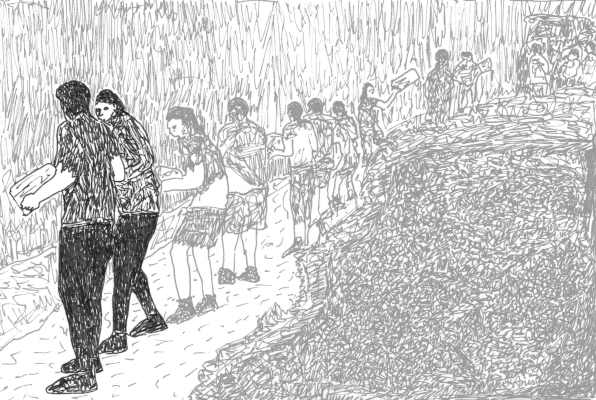 |
(Italiano) Quando arriva la neve, il gruppo si è sistemato nella sua residenza invernale, una grande caverna. Helmut nota che la legna da ardere sta finendo e chiama tutti. Si accorge inoltre che Heinz ha un talento che non è mai stato apprezzato. |
(Deutsch) Als der Schnee kommt, hat sich die Gruppe in ihrem Winterdomizil eingerichtet, einer großen Höhle. Helmut bemerkt, dass das Feuerholz knapp wird, und ruft alle zusammen. Ihm fällt außerdem auf, dass Heinz eine Begabung hat, die noch nie gewürdigt worden ist. Normal Version | ||
Tag 210 1 Helmut: Das Feuerholz geht zur Neige. Wir müssen wieder zum Lager. Sibat? Sibat! Tock tock. Holz! Ja! |
Day 210 Helmut: We're running out of firewood. We have to go to the storeroom again. Zibat? Zibat! Knock knock. Wood! Yes! |
Jour 210 Helmut : Le bois de chauffage s'épuise. Il faut retourner à la réserve. Zibat ? Zibat ! Toc toc. Du bois ! Oui ! |
Giorno 210 Helmut: Stiamo finendo la legna da ardere. Dobbiamo andare di nuovo al deposito. Zibat? Zibat! Toc toc. Legna! Sì! |
Día 210 Helmut: Se nos está acabando la leña. Tenemos que volver al almacén. ¿Sibat? ¡Sibat! Toc, toc. ¡Leña! ¡Sí! |
2 Heinz: Kannst du mal aufhören damit? |
Heinz: Can you stop that? |
Heinz : Tu peux arrêter ça ? |
Heinz: La smetti? |
Heinz: ¿Puedes dejar eso? |
3 Helmut: (...) So, jetzt wird es langsam wieder warm in der Bude! In den nächsten zwei Tagen haben wir Ruhe. |
Helmut: (...) So, now it's slowly getting warm again in the hut! We'll have peace and quiet for the next two days. |
Helmut : (...) Bon, il recommence à faire chaud dans la hutte ! On va avoir la paix pendant deux jours. |
Helmut: (...) Bene, sta tornando caldo nella capanna! Avremo pace e tranquillità per i prossimi due giorni. |
Helmut: (...) ¡Bien, vuelve a hacer calor en la cabaña! Tendremos paz y tranquilidad durante los próximos dos días. |
4 Heinz: Tja, dann sollten wir uns wohl weiter dieser einzigartigen Erfahrung hingeben und das Warten aussitzen. Gähn |
Heinz: Well, then we should probably just continue to indulge in this unique experience and wait out waiting. Yawn |
Heinz : Bon, alors on devrait probablement continuer à profiter de cette expérience unique et laisser passer l'attente. Bâille |
Heinz: Beh, allora dovremmo semplicemente continuare a goderci questa esperienza unica e lasciare passare l'attesa. Sbadiglio |
Heinz: Bueno, entonces probablemente deberíamos seguir disfrutando de esta experiencia única y dejar pasar la espera. Bostezo |
(English) A new spring is dawning, and the Boys are nowhere closer to home. Lost in thought, they sit by the fire in their winter cave until Helmut reports on unexpected cultural and historical developments that make Heinz prick up his ears. |
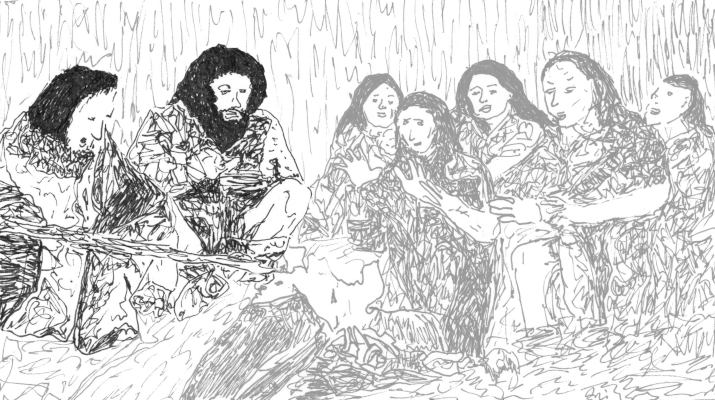 |
(Italiano) Sta arrivando una nuova primavera e i Ragazzi non sono affatto più vicini a casa. Seduti davanti al fuoco nella loro tana invernale, sono persi nei loro pensieri, finché Helmut racconta di alcuni sviluppi storici e culturali inaspettati che attirano l'attenzione di Heinz. |
(Deutsch) Ein neuer Frühling bricht an und die Jungs sind der Heimat kein bisschen nähergekommen. Gedankenverloren sitzen sie am Feuer in ihrer Winterhöhle, bis Helmut von unerwarteten kulturhistorischen Entwicklungen berichtet, die Heinz hellhörig machen. Normal Version | ||
Tag 286 1 Heinz: Mit dem zeitlichen Abstand fallen einem Sachen auf, an die man vorher nicht gedacht hat. |
Day 286 Heinz: With the benefit of hindsight, you notice things you didn't think about before. |
Jour 286 Heinz : Avec le recul, on remarque des trucs auxquels on n'avait pas pensé avant. |
Giorno 286 Heinz: Col senno di poi, ti accorgi di cose a cui prima non avevi pensato. |
Día 286 Heinz: En retrospectiva con el paso del tiempo, te das cuenta de cosas en las que no habías pensado antes. |
2 Helmut: Ach so, ja. Also, ich halte es mit Kaiser Wilhelm: Soll doch jeder nach seiner Fassung glücklich werden. |
Helmut: Oh, yes. Well, I agree with Kaiser Wilhelm: Let everyone be happy in their own version. |
Helmut : Ah oui. Eh bien, moi je suis avec l'empereur Guillaume : que chacun soit heureux à sa propre version. |
Helmut: Ah sì. Beh, io sono d'accordo con l'imperatore Guglielmo: che ognuno sia felice nella propria loggia. |
Helmut: Ah, sí. Bueno, yo estoy con el káiser Guillermo: cada hombre se salve a su bandera. |
3 Heinz: Das ist absurd. |
Heinz: That's absurd. |
Heinz : C'est absurde. |
Heinz: È assurdo. |
Heinz: Eso es absurdo. |
4 Heinz: Und welcher Schmetterling ist aus dem Kokon geschlüpft? |
Heinz: And what butterfly emerged from the cocoon? |
Heinz : Et quel papillon est sorti du cocon ? |
Heinz: E quale farfalla è uscita dal bozzolo? |
Heinz: ¿Y qué mariposa salió del capullo? |
(English) The prehistoric group has come full circle and returned to their summer residence. The gaba season has already begun when Unggur and a few others return from hunting and excitedly report on their encounter with other humans. Heinz has a hunch. |
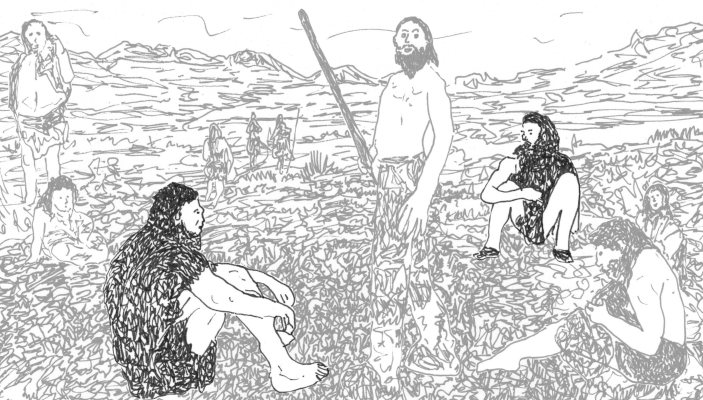 |
(Italiano) Il gruppo preistorico ha chiuso il cerchio ed è tornato alla sua residenza estiva. La stagione del gaba è già iniziata quando Unggur e alcuni altri tornano dalla caccia e raccontano eccitati del loro incontro con altri esseri umani. Heinz sospetta qualcosa. |
(Deutsch) Die prähistorische Gruppe hat den Kreis geschlossen und ist in ihre Sommerresidenz zurückgekehrt. Die Gaba-Saison hat bereits begonnen, als Unggur und einige andere von der Jagd kommen und aufgeregt über ihre Begegnung mit anderen Menschen berichten. Heinz hat eine Ahnung. Normal Version | ||
Neues Datum Tag 331 1 Helmut: Fang auf! |
New Date Day 331 Helmut: Catch! |
Nouvelle date Jour 331 Helmut : Attrape ! |
Nuova data Giorno 331 Helmut: Prendi! |
Nueva fecha Día 331 Helmut: ¡Atrápala! |
2 Helmut: Also gut, der Schlüssel ist unter der Fußmatte. |
Helmut: All right, the key is under the doormat. |
Helmut : Bon, d'accord, la clé est sous le paillasson. |
Helmut: Va bene, la chiave è sotto lo zerbino. |
Helmut: Está bien, la llave está debajo del felpudo. |
3 Helmut: Was ...? Das ganze Dorf ist zusammengekommen. Worum geht's da? Verstehst du irgendwas? |
Helmut: What...? The whole village has gathered. What's going on? Do you understand anything? |
Helmut : Qu'est-ce que... ? Tout le village s'est rassemblé. De quoi s'agit-il ? Tu comprends quelque chose ? |
Helmut: Cosa...? Si è radunato tutto il villaggio. Che succede? Capisci qualcosa? |
Helmut: ¿Qué...? Todo el pueblo se ha reunido. ¿Qué está pasando? ¿Entiendes algo? |
4 Helmut: Diese Gesten jetzt verstehe ich so, dass die anderen einladende Handbewegungen gemacht haben, aber Unggur und die Unsrigen haben es vorgezogen, das Weite zu suchen, weil sie Panik gekriegt haben. |
Helmut: I understand these gestures now to mean that the others made inviting hand movements, but Unggur and our people preferred to take to their heels because they panicked. |
Helmut : Ces gestes maintenant, je comprends que les autres ont fait des signes d'invitation, mais Unggur et les nôtres ont préféré prendre la fuite parce qu'ils ont paniqué. |
Helmut: Secondo me questi gesti adesso significano che gli altri facevano dei movimenti invitanti con le mani, ma Unggur e la nostra gente hanno preferito darsi alla fuga perché si sono spaventati. |
Helmut: Yo interpreto esos gestos ahora como que los otros hacían movimientos de invitación con las manos, pero Unggur y los nuestros prefirieron huir porque se asustaron. |
(English) What Helmut has been warning his friend about for months has now come to pass: problems with fake Fiona, alias Ano-eef. However, they don't have time to discuss the matter in detail, because a monstrous danger appears out of nowhere. |
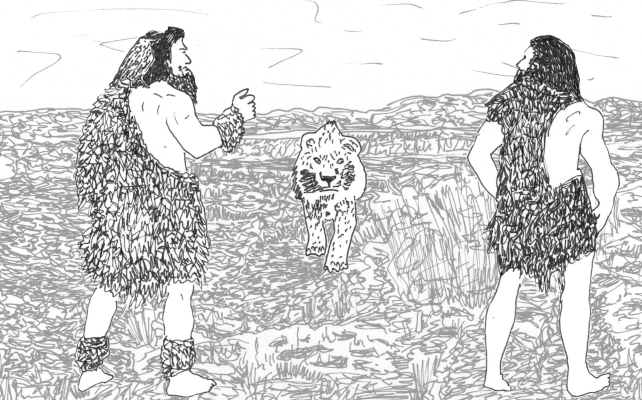 |
(Italiano) Quello che Helmut aveva previsto da mesi per il suo amico è finalmente successo: problemi con pseudo-Fiona, alias Anoif. Ma non hanno tempo per discutere la questione, perché un pericolo mostruoso appare dal nulla. |
(Deutsch) Das, wovor Helmut seinen Freund seit Monaten gewarnt hat, ist nun eingetreten: Probleme mit Pseudo-Fiona alias Ano-if. Sie haben allerdings keine Zeit, die Sache abschließend zu besprechen, denn eine monströse Gefahr erscheint aus dem Nichts. Normal Version | ||
Tag 334 1 Helmut: Komm mal bitte grad mit da vorne rüber. Ey, was ist los mit dir? Du rennst hier rum wie Jack Nicholson in Shining. |
Day 334 Helmut: Could you please join me over there? Hey, what's wrong with you? You're running around like Jack Nicholson in The Shining. |
Jour 334 Helmut : Pourrais-tu me rejoindre là-bas ? Hé, qu'est-ce qui ne va pas chez toi ? Tu cours ici comme Jack Nicholson dans Shining. |
Giorno 334 Helmut: Potresti raggiungermi laggiù? Ehi, cosa c'è che non va in te? Stai correndo come Jack Nicholson in Shining. |
Día 334 Helmut: ¿Podrías venir aquí conmigo? Eh, ¿qué te pasa? Corres como Jack Nicholson en El Resplandor. |
2 Heinz: Sie sitzt da bei Fenna und heult sich bei ihr aus, siehst du? |
Heinz: She's sitting there with Fenna and crying to her, see? |
Heinz : Elle est assise là avec Fenna et pleure sur son épaule, tu vois ? |
Heinz: È seduta lì con Fenna e piange sulla sua spalla, vedi? |
Heinz: Está sentada ahí con Fenna y llora sobre su hombro, ¿ves? |
3 Heinz: Er kommt langsam auf uns zu. Auf dich, genau genommen. |
Heinz: He's slowly coming towards us. Towards you, actually. |
Heinz : Il s'approche lentement de nous. De toi, en fait. |
Heinz: Sta venendo lentamente verso di noi. Verso di te, in realtà. |
Heinz: Viene lentamente hacia nosotros. Hacia ti, en realidad. |
4 Heinz: OK, alter Junge, ganz ruhig! |
Heinz: OK, old boy, take it easy! |
Heinz : OK, mon vieux, du calme ! |
Heinz: OK, vecchio mio, calmati! |
Heinz: Vale, viejo amigo, ¡tranquilo! |
(English) Helmut's curiosity leads the Boys to the Neanderthals. Kelhara and Beeker accompanies them on their trip. Helmut isn't afraid, because he now believes himself to be immortal. However, he becomes careless and it is unclear how things will end. |
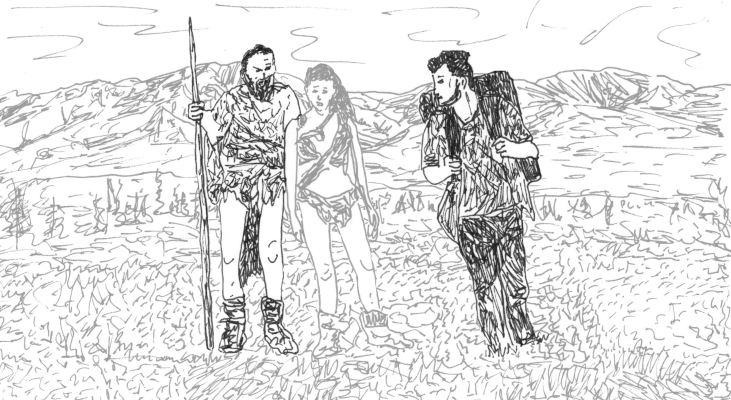 |
(Italiano) La curiosità di Helmut conduce i Ragazzi dai Neanderthal. Kelhara e Bìker si uniscono al viaggio. Helmut non ha paura perché ora si crede immortale. Tuttavia, diventa imprudente e non si sa come andranno le cose. |
(Deutsch) Helmuts Neugier treibt die Jungs zu den Neandertalern. Kelhara und Bieker begleiten ihren Ausflug. Angst hat Helmut nicht, denn er hält sich jetzt für einen Unsterblichen. Allerdings wird er unvorsichtig und es ist nicht absehbar, wie die Sache ausgeht. Normal Version | ||
Tag 335 1 Heinz: Ich habe die Legende vom Löwen mit dem Dorn in der Pfote begründet. Ich. |
Day 335 Heinz: I originated the legend of the lion with the thorn in its paw. Me. |
Jour 335 Heinz : C'est moi qui ai lancé la légende du lion avec une épine dans la patte. Moi. |
Giorno 335 Heinz: Io ho dato origine la leggenda del leone con la spina nella zampa. Io. |
Día 335 Heinz: Yo di origen la leyenda del león con la espina en la pata. Yo. |
2 Helmut: (...) Das da hinten könnten schon die drei Kiefern auf dem Hügel sein, von denen Anggur gesprochen hat. Dahinter hat er Andi und seine Leute getroffen. Ich dachte, wir brauchen länger für die Strecke. |
Helmut: (...) That could already be the three pine trees on the hill that Anggur was talking about. He met Andy and his men behind them. I thought it would take us longer for the distance. |
Helmut : (...) Cela pourrait déjà être les trois pins sur la colline dont parlait Anggur. Derrière, il a rencontré Andi et ses hommes. Je pensais qu'il nous faudrait plus de temps pour couvrir la distance. |
Helmut: (...) Potrebbero già essere i tre pini sulla collina di cui parlava Anggur. Ha incontrato Andi e i suoi uomini dietro di loro. Pensavo che ci sarebbe voluto più tempo per coprire la distanza. |
Helmut: (...) Ésos podrían ser ya los tres pinos de la colina de los que hablaba Anggur. Se encontró con Andi y sus hombres detrás de ellos. Pensaba que tardaríamos más en cubrir la distancia. |
3 Helmut: Bieker sieht das anders. Würde mich nicht wundern, wenn wir auch noch Dinosaurier zu Gesicht bekämen. |
Helmut: Beeker sees things differently. I wouldn't be surprised if we were to see dinosaurs too. |
Helmut : Biqueur voit les choses différemment. Je ne serais pas surpris si nous voyions aussi des dinosaures. |
Helmut: Bìker vede le cose in modo diverso. Non mi sorprenderebbe se vedessimo anche dei dinosauri. |
Helmut: Bíker lo ve de otra manera. No me sorprendería que viéramos también dinosaurios. |
4 Heinz: Wir waren abgelenkt und sie haben uns entdeckt. Was machen wir jetzt? |
Heinz: We were distracted and they discovered us. What do we do now? |
Heinz : Nous étions distraits et ils nous ont repérés. Qu'est-ce qu'on fait maintenant ? |
Heinz: Eravamo distratti e ci hanno scoperto. Cosa facciamo adesso? |
Heinz: Estábamos distraídos y nos descubrieron. ¿Qué hacemos ahora? |
(English) Despite Helmut's clumsiness, the first encounter with the Neanderthals takes a positive turn. But before Heinz can breathe a sigh of relief, his friend gets him into trouble again and someone else has to rescue him. Someone stronger. Much stronger. |
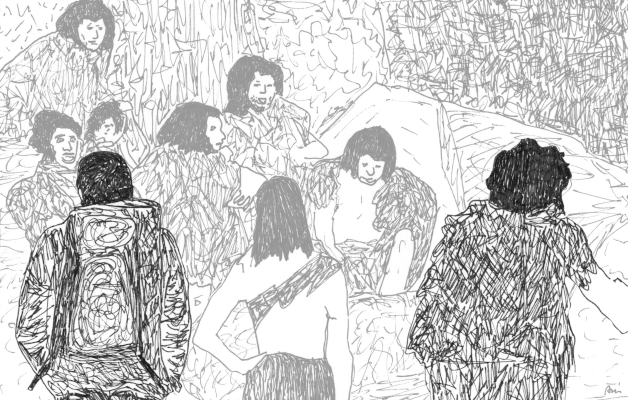 |
(Italiano) Nonostante la goffaggine di Helmut, il primo incontro con i Neandertaliani si svolge in modo positivo. Ma prima che Heinz possa tirare un sospiro di sollievo, il suo amico lo mette nuovamente in una situazione difficile e qualcun altro deve salvarlo. Qualcuno più forte. Molto più forte. |
(Deutsch) Trotz Helmuts Tollpatschigkeit nimmt die erste Begegnung mit den Neandertalern einen positiven Verlauf. Bevor Heinz aber aufatmen kann, bringt sein Freund ihn erneut in eine missliche Lage und jemand anderes muss ihn retten. Jemand Stärkeres. Viel Stärkeres. Normal Version | ||
Birkenpech Tag 335 1 Helmut: Es ist gerade noch mal gutgegangen, hab ich recht? |
Birch Tar Day 335 Helmut: It barely worked out, am I right? |
Jour 335 Helmut : Ça s'est à peine bien passé, n'est-ce pas ? |
Giorno 335 Helmut: È andata a malapena, vero? |
Día 335 Helmut: Al final todo ha salido bien, ¿tengo razón? |
2 Helmut: Glaub ich zwar nicht, aber trotzdem ein guter Tipp. Sag mal, wie viele Urmenschenarten gibt es eigentlich im Moment auf der Welt? |
Helmut: I don't think so, but it's still a good tip. Tell me, how many species of prehistoric humans are there in the world at the moment anyway? |
Helmut : Je ne pense pas, mais c'est quand même un bon conseil. Dis-moi, combien d'espèces d'hommes préhistoriques y a-t-il dans le monde en ce moment ? |
Helmut: Non credo, ma è comunque un buon consiglio. Dimmi, quante specie di esseri umani preistorici ci sono attualmente nel mondo? |
Helmut: No lo creo, pero es un buen consejo. Dime, ¿cuántas especies de seres humanos prehistóricos hay actualmente en el mundo? |
3 Heinz: Hier, bitte! Kennt ihr Gaba? Ja, genau, es heißt Gaba. Ga-ba. |
Heinz: Here you go! Do you know gaba? Yes, that's right, it's called gaba. Ga-ba. |
Heinz : Tiens, voilà ! Vous connaissez le gaba ? Oui, c'est ça, ça s'appelle gaba. Ga-ba. |
Heinz: Ecco, prego! Conoscete il gaba? Sì, esatto, si chiama gaba. Ga-ba. |
Heinz: ¡Aquí tienes! ¿Conocéis el gaba? Sí, exacto, se llama gaba. Ga-ba. |
4 Helmut: Ha ha, ja, so wie du die Sache mit ... Hee, Leute, alles cool! Ürgl, mein Hals! Lss mch ls. Hhh |
Helmut: Ha ha, yeah, just the way you took care of this thing with... Hey, guys, take it easy! Owgl, my neck! Lt me b. Hhh |
Helmut : Ha ha, oui, comme tu t'es occupé de cette chose avec... Hé, les gars, du calme ! Ougl, mon cou ! Rlche-mh ! Hhh |
Helmut: Ah ah, sì, proprio come ti sei occupato di questa cosa con... Ehi, ragazzi, fate piano! Ahi, il mio collo! Lsc-thm. Hhh |
Helmut: Ja, ja, sí, como tú te ocupaste de esa cosa con... ¡Eh, chicos, tranquilos! ¡Ougl, mi cuello! ¡Sltd m! Hhh |
(English) With the help of Kelhara, who reenacts his exploits, and Zork, who writes everything down, Helmut secures himself a favorable place in history. Heinz suffers terribly from his imposture, but he has to keep the truth to himself. |
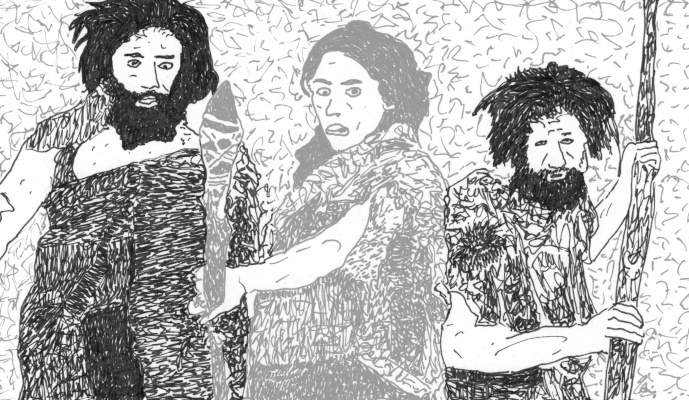 |
(Italiano) Con l'aiuto di Kelhara, che mette in scena le sue imprese eroiche, e di Zork, che scrive tutto, Helmut si assicura un posto di rilievo nella storia. Heinz soffre tantissimo per la sua impostura, ma deve tenere nascosta la verità. |
(Deutsch) Mit der Hilfe von Kelhara, die seine Heldentaten szenisch nachspielt, und Sork, der alles aufschreibt, sichert sich Helmut einen vorteilhaften Platz in der Geschichte. Heinz leidet fürchterlich unter seiner Hochstapelei, aber er darf die Wahrheit nicht verraten. Normal Version | ||
Tag 336 1 Helmut: Und ich bin auf dem Löwen geritten. Kelhara hat's gesehen. |
Day 336 Helmut: And I rode the lion. Kelhara saw it. |
Jour 336 Helmut : Et j'ai chevauché le lion. Kelhara l'a vu. |
Giorno 336 Helmut: E ho cavalcato il leone. Kelhara l'ha visto. |
Día 336 Helmut: Y monté en el león. Kelhara lo vio. |
2 Helmut: Mit geschliffenen Kanten! Für die Chronik. Er wird über den Flugsaurier schreiben, den die Amazone mit einem Blitz aus ihrem Speer vernichtet hat. |
Helmut: With polished edges! For the chronicle. He'll write about the pterosaur that the Amazon destroyed with a bolt of lightning from her spear. |
Helmut : Avec des bords polis ! Pour la chronique. Il écrira sur le ptérosaure que l'Amazone a détruit d'un éclair de sa lance. |
Helmut: Con i bordi levigati! Per la cronaca. Scriverà dello pterosauro che l'Amazzone ha distrutto con un fulmine dalla sua lancia. |
Helmut: ¡Con bordes pulidos! Para la crónica. Escribirá sobre el pterosaurio que la Amazona destruyó con un rayo de su lanza. |
3 Helmut: Kelhara, bist du bereit? Fang am besten mit der Geschichte an, in der ich bemerke, wie uns der Löwe heimlich folgt, um uns zu beschützen. |
Helmut: Kelhara, are you ready? Best start with the story where I notice the lion secretly following us to protect us. |
Helmut : Kelhara, es-tu prête ? Mieux vaut commencer par l'histoire où je remarque que le lion nous suit secrètement pour nous protéger. |
Helmut: Kelhara, sei pronta? Meglio iniziare con la storia in cui noto che il leone ci segue segretamente per proteggerci. |
Helmut: Kelhara, ¿estás lista? Mejor empezar con la historia en la que me doy cuenta de que el león nos sigue en secreto para protegernos. |
4 Helmut: Du bringst mich ganz durcheinander. Lass uns das später besprechen, ich muss mich auf den Bericht konzentrieren. |
Helmut: You're getting me all mixed up. Let's discuss this later, I have to concentrate on the report. |
Helmut : Tu me perturbes. Discutons-en plus tard, je dois me concentrer sur le rapport. |
Helmut: Mi stai confondendo le idee. Discutiamone più tardi, io devo concentrarmi sulla relazione. |
Helmut: Me estás confundiendo. Discutámoslo más tarde, tengo que concentrarme en el informe. |
(English) Heinz finds Helmut in the clubhouse, where he is playing teacher to the prehistoric children, with a blackboard, a globe, and a poorly assembled wolf skeleton. Everything seems completely normal to Heinz and Helmut, but within a few minutes, everything changes. |
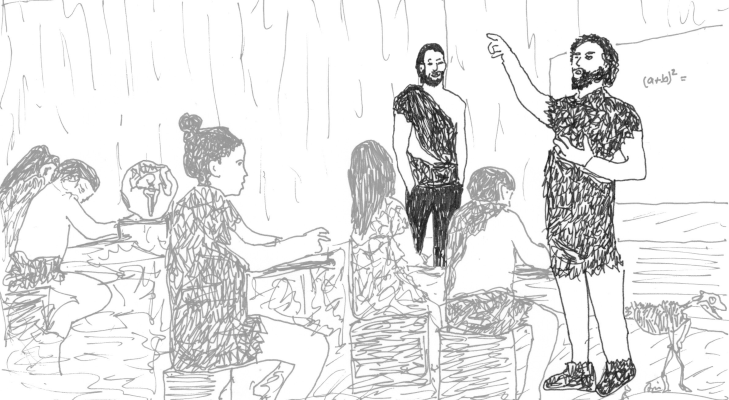 |
(Italiano) Heinz trova Helmut nel club-house, dove fa finta di essere un insegnante per i bambini preistorici, con una lavagna, un mappamondo e uno scheletro di lupo assemblato male. Tutto sembra normale per Heinz e Helmut, ma in pochi minuti tutto cambia. |
(Deutsch) Heinz findet Helmut im Clubhaus, wo er Lehrer für die Urzeitkinder spielt, mit Tafel, Globus und einem falsch zusammengebauten Wolfsskelett. Alles wirkt für Heinz' und Helmuts Verhältnisse völlig normal, als sich innerhalb weniger Minuten alles verändert. Normal Version | ||
Tag 338 1 Heinz: Ach hier im Clubhaus bist du mit den Kindern. Ich dachte schon, dass du den Rattenfänger aus Hameln in deine absurden Geschichten einbauen willst. Was tut ihr hier? |
Day 338 Heinz: Oh, you're here in the clubhouse with the children. I already suspected you wanted to incorporate the Pied Piper from Hamelin into your absurd stories. What are you doing here? |
Jour 338 Heinz : Ah, ici, au club-house, tu es avec les enfants. Je me doutais bien que tu voulais inclure le joueur de flûte de Hamelin dans tes histoires absurdes. Qu'est-ce que vous faites ici ? |
Giorno 338 Heinz: Oh, sei qui nel club-house con i bambini. Sospettavo già che volessi incorporare il pifferaio di Hamelin nelle tue storie assurde. Che ci fate qui? |
Día 338 Heinz: Oh, estás aquí en el club con los niños. Ya sospechaba que querías incorporar al flautista de Hamelin en tus historias absurdas. ¿Qué hacéis aquí? |
2 Helmut: Was, das? Ein Wolfsskelett. Hab ich gestern mit Kelhara gebastelt. Mit dem Superkleber, den Andi uns geschenkt hat. |
Helmut: What, that? A wolf skeleton. I tinkered with Kelhara yesterday to make it. With the super glue Andy gave us. |
Helmut : Quoi, ça ? Un squelette de loup. J'ai bricolé avec Kelhara hier pour le fabriquer. Avec la super colle qu'Andi nous a donnée. |
Helmut: Cosa, quello? Uno scheletro di lupo. Ieri ho armeggiato con Kelhara per realizzarlo. Con la super colla che ci ha dato Andi. |
Helmut: ¿Qué, eso? Un esqueleto de lobo. Ayer lo hice con Kelhara. Con el superpegamento que nos dio Andi. |
3 Helmut: Mann, lass mich! Du störst den Unterricht! Was ist denn, Gind? Das soll der Satz des Pythagoras sein? Mädchen, das ist eine Sinuskurve, die du an die Tafel gemalt hast. Wie kann man das verwechseln? Wer hilft ihr aus? Keiner? |
Helmut: Man, leave me alone! You're disrupting the lesson! What's the matter, Gind? That's supposed to be the Pythagorean theorem? Girl, that's a sine curve you drew on the blackboard. How can you get that mixed up? Who's helping her out? No one? |
Helmut : Mec, laisse moi tranquille ! Tu perturbes le cours ! Qu'est-ce qu'il y a, Gind ? C'est censé être le théorème de Pythagore ? Ma fille, c'est une courbe sinusoïdale que tu as dessinée au tableau. Comment peut-on confondre ? Qui l'aide ? Personne ? |
Helmut: Amico, lasciami in pace! Stai disturbando la lezione! Che c'è, Gind? Quello dovrebbe essere il teorema di Pitagora? Ragazza, quella è una curva sinusoidale che hai disegnato alla lavagna. Come si fa a confonderle? Chi la aiuta? Nessuno? |
Helmut: ¡Tío, déjame en paz! ¡Estás interrumpiendo la clase! ¿Qué pasa, Gind? ¿Eso se supone que es el teorema de Pitágoras? Chica, eso que has dibujado en la pizarra es una curva sinusoidal. ¿Cómo puedes confundirlas? ¿Alguien puede ayudarla? ¿Nadie? |
4 Heinz: Du, die anderen stehen auch alle da draußen. Aber ... Das sind viel mehr als sonst. Wer ist das? |
Heinz: Hey, the others are all out there too. But... There are a lot more of them than usual. Who is that? |
Heinz : Hé, les autres sont tous là dehors aussi. Mais... Ils sont beaucoup plus nombreux que d'habitude. Qui est-ce ? |
Heinz: Ehi, anche gli altri sono tutti fuori. Ma... sono molti più del solito. Chi sono? |
Heinz: Eh, los demás también están ahí fuera. Pero... Son muchos más de lo habitual. ¿Quiénes son? |
(English) All's well that ends well. Everyone makes mistakes, and we shouldn't blame the Boys. After all, they gave us a unique insight into the world as it was many thousands of years ago. And who knows, maybe someone will find Zork's chronicles one day. |
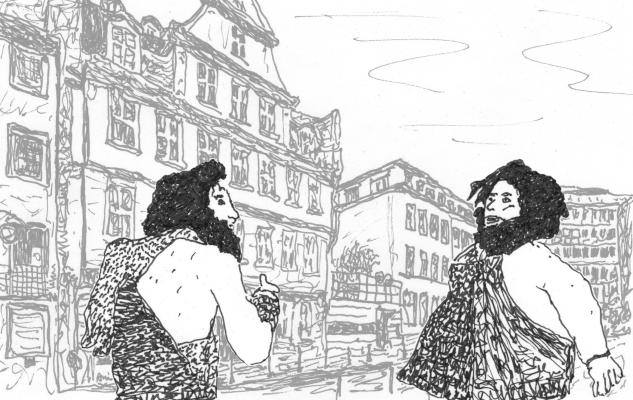 |
(Italiano) Tutto è bene quel che finisce bene. Tutti sbagliano ogni tanto e non dovremmo prendersela con i Ragazzi. Dopotutto, ci hanno dato un'occasione unica per dare un'occhiata al mondo di tanti millenni fa. E chissà, magari un giorno qualcuno troverà le cronache di Zork. |
(Deutsch) Ende gut, alles gut. Jeder macht mal Fehler und man sollte es den Jungs nicht anlasten. Immerhin haben sie uns einen einmaligen Einblick in die Welt vor vielen Jahrtausenden gewährt. Und wer weiß, vielleicht findet irgendwann jemand Sorks Chroniken. Normal Version | ||
Tag 4 1 Helmut: Wupp |
Day 4 Helmut: Whoop |
Jour 4 Helmut : Woup |
Giorno 4 Helmut: Vup |
Día 4 Helmut: Vup |
2 Heinz: Woher willst du das wissen? Es ist Nachmittag. Die Sterne stehen noch nicht am Himmel. |
Heinz: How do you know that? It's the afternoon. The stars aren't in the sky yet. |
Heinz : Comment sais-tu cela ? C'est l'après-midi. Les étoiles ne sont pas encore dans le ciel. |
Heinz: Come fai a saperlo? È pomeriggio. Le stelle non sono ancora in cielo. |
Heinz: ¿Cómo lo sabes? Es por la tarde. Las estrellas aún no están en el cielo. |
3 Heinz: Als du dich im Camp über den Stein gebeugt hast, hast du ihn mit deinem Ring berührt. Das hat auch geleuchtet. Ich hab es aus den Augenwinkeln gesehen. Der Impuls war so stark, dass wir keine mentale Kammern brauchten. Wir sind einfach losgeflogen. |
Heinz: When you bent over the stone at camp, you touched it with your ring. There it was also shining. I saw it out of the corner of my eye. The impulse was so strong that we didn't need mental chambers. We just flew off. |
Heinz : Quand tu t'es penché sur la pierre au camp, tu l'as touchée avec ta bague. Ça brillait aussi. Je l'ai vu du coin de l'il. L'impulsion était si forte que nous n'avons pas eu besoin de chambres mentales. Nous nous sommes tout simplement envolés. |
Heinz: Quando ti sei chinato sulla pietra al campo, l'hai toccata con il tuo anello. Anche brillava. L'ho visto con la coda dell'occhio. L'impulso era così forte che non avevamo bisogno di camere mentali. Siamo semplicemente volati via. |
Heinz: Cuando te inclinaste sobre la piedra en el campamento, la tocaste con tu anillo. También brillaba. Lo vi con el rabillo del ojo. El impulso era tan fuerte que no necesitábamos cámaras mentales. Simplemente salimos volando. |
4 Heinz: Wo? Ach da. Oh Mann, ich freu mich auf eine heiße Dusche, das sag ich dir! Ich frag die Polizistin, ob ich Fiona anrufen kann, dann holt sie uns ab. |
Heinz: Where? Ah there. Oh man, I'm looking forward to a hot shower, I tell you! I'll ask the policewoman if I can call Fiona and she'll pick us up. |
Heinz : Où ça ? Ah là. Oh mec, j'ai hâte de prendre une douche chaude, je te le dis ! Je vais demander à la policière si je peux appeler Fiona et elle viendra nous chercher. |
Heinz: Dove? Oh, lì. Oh amico, non vedo l'ora di farmi una doccia calda, te lo dico io! Chiedo alla poliziotta se posso chiamare Fiona e lei verrà a prenderci. |
Heinz: ¿Dónde? Ah, ahí. Oh, tío, ¡estoy deseando darme una ducha caliente, te lo digo yo! Le preguntaré a la policía si puedo llamar a Fiona y ella vendrá a recogernos. |
| Weiter geht's mit Staffel 12: Die Jungs campen / The story continues with The Boys Go Camping |
| up |  |
| Datenschutzerklärung und Impressum (data privacy statement and imprint) |